
Should I Mention My Religion in My College Essay?
Here’s another key tip to keep in mind for your college applications, from College Essay Guy Ethan Sawyer!
The short answer is this: it’s okay to discuss religion in your essay as long as the take-away (or values) promoted in the essay are universal. Here’s what I mean:
In the past, I’ve had students write essay drafts that end with something like, “Since accepting Christ (or) learning to meditate (or) converting to Judaism, I’ve made it my goal to tell others about the difference that Christ/meditation/Judaism can make in their lives.” I call this the “missionary” essay. And it can be off-putting to readers, particularly to those who don’t share your religious beliefs (which, statistically speaking, is likely).
Instead, discuss the values you gained through your religion. How?
Step 1: Take a look at this Values List and ask yourself: what values have I gained through my religion?
Examples: “Getting used to wearing a turban in ninth grade helped increase my self-confidence and, interestingly, my grades went up that year!” (or) “Feeling judged by my youth group leader helped me better understand how my friend must have been feeling about me; I realized I was essentially doing the same thing to her.”
Check out the values displayed in those sentences: self-confidence and empathy. Nice! And anyone, no matter the religion or belief system, can get on board with those.
Step 2: Make sure the values you’re discussing are non-obvious and specific. Obvious connections lead to boring essays.
Examples: “Playing in the band at church helped me learn the value of working with others” (seen it!) (or) “Volunteering at our mosque helped me develop myself personally” (super vague–say how!).
Step 3: Get feedback from someone who does not share your religious belief. Once s/he has read the essay, ask the person: do you feel closer to me after having read that? If the answer isn’t “Yes,” or even if the person hesitates before responding, ask, “What would help you feel closer to me?”
Step 4: Listen with your entire being. Stay curious about his/her feedback to you.
Step 5: Thank the person and go back to the drawing board.
Because you are creative and original and you have something important to communicate.
For more personal statement help, check out www.collegeessayguy.com .

This post was written by a friend of Magoosh.
View all posts
More from Magoosh

3 responses to “Should I Mention My Religion in My College Essay?”
I was wondering if writing about struggles with religion would be appropriate. My topic is trying balance christianity and my sexuality, and I was wondering how exactly I should frame that, if even write about it at all.
Hi Isaac, our expertise is in test prep, not admissions advice, so I first have to say that I’m not an expert in this topic. This is also an very personal topic that you should make sure you feel comfortable writing about, and keep in mind that you will probably want to have others proofread and critique your essay. That being said, you can definitely write a strong essay about balancing your sexuality and religion using the guidelines in this blog post. It sounds like this is a big part of your identity, and your personal statement is all about letting your personality, strengths, and introspective abilities shine.
Interesting!
Leave a Reply Cancel reply
Your email address will not be published. Required fields are marked *
100+ Religion Essay Topics
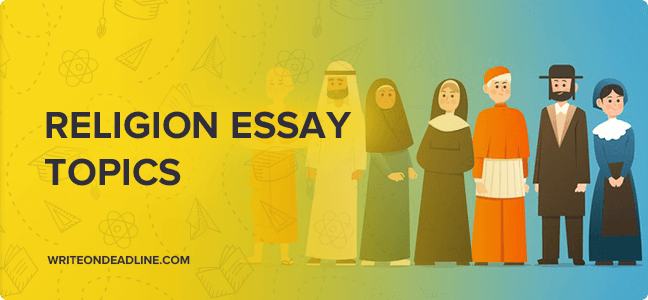
The realm of religion has always been a deeply fascinating and, at times, contentious area of study. The possibilities for exploration are vast, from theological doctrines to the impact of religion on societies. If you are a student or an enthusiast looking to delve into religious studies through essays, you’ve come to the right place.
Table of Contents
What is a Religion Essay?
A religion essay is a piece of writing that explores topics related to spirituality, theological doctrines, the historical evolution of religions, religious practices, and the impact of religion on various facets of society. It provides an avenue for individuals to critically examine and articulate their understanding of a religious subject, fostering both introspection and academic analysis.
Guide on Choosing a Religion Essay Topic
In 100-150 words? Here goes: Choosing a topic for a religion essay can be overwhelming, given the vastness of the subject. Start by narrowing your focus. Are you more interested in theological concepts, historical events, or social impacts? Research current events related to religion, as contemporary issues can provide fresh perspectives. Reflect on personal experiences or curiosities. It’s always easier to write on topics you’re passionate about. Lastly, ensure your chosen topic has enough credible sources available for a well-researched essay.
Religion Essay Topics Lists
Theological concepts.
- The Concept of God in Abrahamic Religions
- Karma and Reincarnation in Hinduism
- The Significance of Nirvana in Buddhism
- Sufism: The Mystical Dimension of Islam
- The Holy Trinity in Christianity: Interpretations and Beliefs
Historical Events
- The Crusades: Religious Zeal or Political Conquest?
- The Reformation and its Impact on Christianity
- Spread of Islam: Historical Perspectives and Causes
- Ancient Egyptian Religion and its Influence on Society
- The Role of the Vatican during World War II
Social Impacts
- Religion and its Role in Shaping Moral Values
- The Influence of Religion on Art and Architecture
- Religion and Politics: A Dangerous Liaison?
- Impact of Secularism on Modern Societies
- Feminism and Religion: Points of Convergence and Divergence
Contemporary Issues
- The Rise of Atheism in the 21st Century
- Religion and LGBTQ+ Rights: Conflicts and Resolutions
- Modern Religious Movements and Cults: A Study
- Religion in the Age of Technology: Evolution or Dissolution?
- Climate Change: Religious Perspectives and Responsibilities
Personal Reflections
- My Spiritual Journey: Discoveries and Challenges
- Religion in My Family: Traditions and Changes
- The Role of Prayer in My Life
- Personal Experiences with Religious Tolerance and Intolerance
- Finding Peace: A Personal Encounter with Meditation
Historical Contexts
- The Fall of Constantinople: Religious Implications
- The Establishment of the Church of England
- Comparative Analysis: Spread of Christianity and Islam in Africa
- The Dead Sea Scrolls: Relevance and Discoveries
- Influence of the Byzantine Church on Orthodox Christianity
Theological Doctrines
- Comparative Analysis of Heaven in Different Religions
- The Role of Angels and Demons across Religions
- Salvation in Christian Theology
- Islamic Views on Predestination
- Hindu Views on Creation and Cosmos
Philosophical Questions
- The Problem of Evil in Religious Thought
- The Existence of God: Arguments For and Against
- Morality: Divine Command Theory vs. Secular Ethics
- Free Will vs. Divine Determinism
- The Concept of Soul in Various Religions
Modern Interpretations and Movements
- Progressive Christianity: A New Age Movement?
- Jihad: Misunderstandings and Clarifications
- Spiritual but Not Religious: The Rise of Secular Spirituality
- Neo-Paganism and Modern Witchcraft
- The Baha’i Faith and Its Universal Message
Religious Practices and Rituals
- The Significance of Hajj in Islam
- Christian Sacraments: Symbols and Meanings
- Hindu Festivals and Their Socio-religious Importance
- Jewish Dietary Laws: Significance and Practice
- Zen Buddhism: Practices and Philosophies
Religion and Society
- The Role of Religion in Contemporary Politics
- Religion and Education: Benefits and Drawbacks
- Religious Perspectives on Healthcare Ethics
- The Impact of Religion on Family Structures
- Religion in Media: Representation and Bias
Interfaith and Comparative Studies
- Comparative Study of Abrahamic Religions
- Eastern vs. Western Spiritual Practices
- Similarities in Creation Myths Across Religions
- Comparative Study of Ascetic Practices in Religions
- Rituals of Death and Afterlife Across Cultures
Gender and Religion
- Female Figures in Christianity: Beyond Mary
- The Role of Women in Islamic Societies
- Feminine Divinities in Hinduism
- Gender Roles in Traditional and Modern Jewish Practices
- The Evolution of Gender Norms in Buddhist Traditions
Religion and Science
- Religious Perspectives on Evolution
- The Vatican and Astronomy: A Historic Relationship
- Islamic Contributions to Science and Mathematics
- Hindu Cosmology and Modern Astrophysics
- Buddhism and Psychology: Overlaps and Insights
Mysticism and Esoteric Beliefs
- Kabbalah: Jewish Mysticism Explored
- Christian Gnostic Traditions
- Sufism: The Heart of Islamic Mysticism
- Tantra in Hinduism and Buddhism: Misunderstandings and Realities
- The Rosicrucians: History and Beliefs of a Mysterious Order
Sacred Texts and Their Interpretations
- The Bhagavad Gita: A Philosophical Analysis
- Parables in the New Testament: Meanings and Implications
- The Talmud and Its Relevance in Contemporary Judaism
- The Tao Te Ching: Exploring Daoist Philosophy
- Themes of Justice and Mercy in the Qur’an
Religion and Art
- Depictions of Buddha in Art: Evolution and Significance
- Christian Iconography: Symbols and Their Origins
- Islamic Calligraphy: Beauty in Sacred Texts
- Religious Themes in Renaissance Art
- The Influence of Hindu Mythology on Classical Dance Forms
Faith and Modern Challenges
- Addressing Climate Change: Religious Responses and Responsibilities
- Religion in the Digital Age: New Forms of Worship and Community
- The Ethics of Genetic Engineering from Religious Perspectives
- Faith Healing vs. Modern Medicine: A Comparative Analysis
- The Role of Religion in Modern Mental Health Practices
Minor Religions and Sects
- Jainism: Principles of Non-Violence and Asceticism
- The Yoruba Religion: Understanding Orishas and Rituals
- The Alevi Community: Beliefs and Practices
- Zoroastrianism: History and Current Status
- The Raelian Movement: Extraterrestrial Beliefs and Controversies
Call to Action
Overwhelmed by the vastness of religious topics or unsure how to articulate your thoughts cohesively? Let WriteOnDeadline help! Our expert essay writers are well-versed in diverse religious subjects and can craft an impeccable essay tailored to your needs. Don’t hesitate – reach out to us today!
Useful References
- BBC Religions – Comprehensive information on a wide array of religions.
- Religion Online – Full texts by recognized religious scholars.
- Pew Research Center’s Religion & Public Life Project – Offers statistical research and reports on religion’s role in society.

Best Bible Resources For Christians
Bible Facts
- Christian Life
- Read the Bible
Home > Bible Facts > Writing a Perfect Religion Essay for College Students

Writing a Perfect Religion Essay for College Students
Modified: January 9, 2024
Written by: Sven Eggers
Wonder how to write an amazing religion essay for collage? Here's a guideline that covers the basis of what to write and how to write.
- bible facts
- religion essays
(Many of the links in this article redirect to a specific reviewed product. Your purchase of these products through affiliate links helps to generate commission for Christian.net, at no extra cost. Learn more )
Are you a college student wondering how to write the perfect essay on religion? If yes, read on and find all that you need to know about writing a religion essay. This article will cover the basics and all you need to know about writing an excellent essay piece on religion.
What is a Religion Essay

Image by Thought Catalog on Unsplash
Well, religion essays are a kind of paper that relates to religion, belief, and faith.
In college, many students will be required to write a few essays on religion. Students typically struggle with writing assignments of this nature since they haven’t learned how to write professionally. After all, religion is a highly personal subject, and objective discussions about religion can be particularly difficult and generally mind-boggling.
As a result of this, many students prefer outsourcing their writing assignments on religion to a custom essay writing service like Edubirdie. On this “write an essay for me” platform, there are plenty of professional writers for you to choose from with guaranteed transparency on their profiles and reviews. After reviewing, you can simply choose a writer and you will have your essay delivered in no time.
On the other hand, some students prefer completing such religious essays themselves to improve their writing. If you fall under this category we’ve put together some tips for you. for you to ace your religion essay.
Read more : Christian Blogs To Follow Before Writing a Religious Essay
Tip 1: Choosing a Topic for a Religion Essay

Image by Keenan Beasley on Unsplash
Consider a topic that interests you, one that piques your curiosity . Though it’s said that curiosity kills the cat, it’s a much-needed drive in essays, especially ones that deal with theology and mind-boggling ideas. H aving an interest as your personal pedestal throughout is effective for your research and writing.
A contentious issue would make a fantastic topic for a religion essay because it means it’s a topic of interest to people and it gives room and framework to your arguments. An example can be whether hell is a truth or a myth . You can decide to look into where a particular religious idea came from and employ background information and opposing points of view to present your argument. Whatever the topic, always use the most reliable sources you can to back up your claims.
Next, contemplate what your stance is towards the issue and start to build your case around it. Are you for it or against it? Should this topic even be contentious in the first place? Are there other points that should be contended besides what has already been debated? Usually, a great religious essay identifies the issue and has tight arguments to support the thesis. But, an amazing essay is one that brings in a fresh perspective that’s been rarely discussed in class. So, work around that.
This step is usually the toughest, but once you’ve passed through it, the rest of the work is a breeze.
Tip 2: How to Write an Introduction for a Religion Essay

Image by Patrick Perkins on Unsplash
Prepare your notes and an overview of your case before beginning to write the introduction. In contrast to creative writing , the reader expects your thesis statement and facts up front in an essay. Because of this, seasoned writers advise pupils to read more books and develop their own points of view. But occasionally it can be advantageous to grab an idea from someone who wrote it before you. It’s catchy and demonstrates your familiarity with the subject. The reader should have a clear understanding of what to anticipate from the article from the beginning.
How can you create a strong essay introduction? The components of a strong introduction are numerous such as some background information, a thesis statement, a purpose statement, and a summary of what’s to be covered. Essentially, your introduction is your first impression and a blueprint of what the entire essay will be.
The topic and focus of the essay, as well as a few other important concepts, should be covered in the first paragraph. Along with the thesis, it should also give background details and the context of the argument. It should also describe the essay’s structure, which is outlined in the last paragraph. The importance of the introduction increases as the essay gets longer. Even though it may appear tedious, just like any first impression, the introduction is an important component of any paper.
Tip 3: How to Write the Body of a Religion Essay

Image by green chameleon on Unsplash
Introduce the basic tenets and principles of the religion you’re addressing in the major body of your essay. Then, you should investigate the crucial components of the tradition. What are its core ideals and beliefs? What role does it play in society? How is it relevant in our current world? Textual support must be provided because this is an excellent approach to capturing your readers’ interest.
The promise you made in your introduction should be fulfilled in the body of your essay. Make sure to add new proof to the main argument of each paragraph in the body of your essay. Each paragraph should be concluded with a sentence that emphasizes the importance of the argument and connects it to the following one.
Tip 4: How to Write the Conclusion Section for a Religion Essay

Image by Christin Hume on Unsplash
Your conclusion is a paragraph (or two) of concluding remarks that demonstrate the points you’ve made are still true and worth considering . Think of it as a final impression you make on the readers, you’d want to make yourself memorable Additionally, it should demonstrate that the arguments you made in the essay’s main body are supported by relevant evidence.
A great conclusion is also one that highlights the significance of your points and directs readers toward the best course of action for the future. This shows that you aren’t just someone who debates but someone who is also willing to try and better the situation. Keep in mind that your final chance to convince or impress your audience is the conclusion.
Read more : Cultural Sensitivity in Student Essays about Religion
Tip 5: Find Proofreaders

Image by Joel Muniz on Unsplash
If I’d learned anything through my years of college essays, it’s to get people to proofread your essay. They are your safety nets. I’d usually find a coursemate or someone from my class to proofread. They are valuable second pairs of eyes to help you spot grammar mistakes but also in concepts that you may have applied. Next, find a friend that’s not from your course or class because they are an accurate assessment of how clear and cohesive your essay is. If they can understand what you’re writing, you can be sure that half the battle is already won.
Was this page helpful?
How To Teach Children About Gods Grace
What Is Prevenient Grace
How Many Gospels In The Catholic Bible
Why Were Some Gospels Not Included In The Bible
What Are The Themes Of The Four Gospels
Latest articles.
Why Believe In Jesus Christ
Written By: Sven Eggers
What Comes After Baptism And Confirmation
What Do You Buy A Boy For First Communion
What Are The Seven Sacraments In Catholicism
What Was The Church Of The Apostles?
Related post.

By: J.C • Christian Resources

By: J.C • Christian Life

By: Cherin • Christian Resources

By: Liming • Christian Resources

By: Maricris Navales • Christian Resources

By: Alyssa Castillo • Christian Life

By: Sophia • Christian Resources

Please accept our Privacy Policy.
CHRISTIAN.NET uses cookies to improve your experience and to show you personalized ads. Please review our privacy policy by clicking here .

- Privacy Overview
- Strictly Necessary Cookies
This website uses cookies so that we can provide you with the best user experience possible. Cookie information is stored in your browser and performs functions such as recognising you when you return to our website and helping our team to understand which sections of the website you find most interesting and useful.
Strictly Necessary Cookie should be enabled at all times so that we can save your preferences for cookie settings.
If you disable this cookie, we will not be able to save your preferences. This means that every time you visit this website you will need to enable or disable cookies again.
- https://christian.net/theology-and-spirituality/writing-a-perfect-religion-essay-for-college-students/
- How It Works
- Prices & Discounts
The College Student's Guide to Writing Theology and Religion Assignments
Table of contents
Growing up, you were always intrigued to learn more about the history and origin of different religions, how the concept of God varies, and the like, which is why you took up Religion and Theology in college with great earnestness.
Yes, it is a fascinating subject, and you thoroughly enjoyed everything the course had to offer until one fine day when you were asked to write a Theology and Religion essay.
Now, you’re just staring at a blank computer screen, wondering where and how to begin! Does that ring a bell?
Wipe away those tears because here’s the complete guide on finishing your Theology and Religion paper and how you can do a brilliant job at it.
Everything About Writing a Theology and Religion College Paper
Theology and Religion studies focus on teaching students about the various types of religions that exist in the contemporary world.
An interdisciplinary field, this subject encourages students to explore how people from different religions and cultures express their faith and the driving reasons behind the same. Regardless of whether you believe in a particular faith, studying Theology and Religion serves as a window to gaining insights into religious ideas and how they shaped the world as we see it today.
Types of Theology and Religion Writing Assignments
Theology and Religion studies involve extensive coursework and writing assignments that are aimed at shaping students’ perspectives on religion while considering the cultural, historical, sociological, and anthropological aspects.
As a Theology and Religion student, here are the four common types of papers you will come across.
Research Paper
This paper requires students to present a thesis statement and make arguments to support it. Being one of the longer assignments, writing research papers needs you to fully explore a particular topic, raise interesting questions and present logical evidence to demonstrate your understanding. You might also need to conduct quantitative and qualitative research to support your paper.
Comparative Essay
As the name suggests, comparative essays involve comparisons while highlighting similarities and differences between two theories or concepts. You are expected to tie your comparisons to a broader theological point.
To learn more about writing compare-and-contrast essays, take a look at this video
Critical Analysis
Contrary to popular perception, critical analysis does not refer to ‘criticizing’ religion or ideology. Instead, you need to break down the text and evaluate the different aspects while gathering research material from various sources to support your claim or argument. The keyword here is - analysis.
Reflection Paper
Reflection papers urge you to reflect, look inwards and present your opinion surrounding a particular theological or religious concept. You get the chance to reflect on your experiences and their impact on shaping your perceptions.
Don’t mistake this for an informal essay - a reflection paper is as ‘formal’ as the others.
How to Write a Theology and Religion Essay for College
Regardless of what type of paper it is, all Theology and Religion essays involve certain steps that, when followed with sincerity and precision, can set you up for success.
Look at the step-by-step guide to writing a Theology and Religion essay for college.
Pick a Focussed Topic
If you have been given a specific topic, you don’t have to worry about this step. What you need to do is understand the question well. Is it asking you to compare, analyze, reflect, review - make sure you know what is expected of you to do justice to it?
Now, let’s look at a situation wherein you are asked to pick a topic or are given an open-ended topic to explore.
The key to a successful paper is a narrow and focused topic or research question. You need to get into the ‘how’s and ‘why to generate a novel paper. It cannot be something that you have learned about in class or one that has been done to death.
To stand out, you need to first entice the instructor with an interesting topic or take on an interesting angle that will set you apart from your classmates.
Here’s a video on how you can narrow down your essay topic
Conduct Extensive Research
Research is key - your paper will only be as strong as the research you do.
So, give yourself ample time to research and scan essential reading material such as journals, online sources, existing research studies, religious texts, and library books. The more you read, the more meat you will have to write this paper.
It is also a good idea to speak to experts in theology and religion to get new views and insights into the topic you are exploring.
Considering the amount of reading you will be doing, always keep a notebook by your side to highlight and take notes on the critical points that would be of use while writing the paper. This is an effective way to gather references for citations at the end of the assignment.
Draft an Outline
Hold on - don’t start writing, not just yet.
Before writing, you must first work on a rough outline. This will ensure you don’t miss out on any points and maintain a logical flow while writing.
So, work on an outline and map your points to the following key headings:
Introduction - introduce the topic and main points of the paper while giving background information and context. This paragraph needs to end with a strong, arguable thesis;
Body - this section consists of multiple paragraphs where you need to discuss your thesis and present your arguments and evidence obtained from research;
Conclusion - the concluding paragraph needs to reinstate your thesis statement and do a quick recap of your main arguments.
Start the Writing Process
Now that you have your outline ready with the crucial points, you can finally start writing.
Considering the amount of information you are grappling with, you might get overwhelmed initially - not knowing how to articulate yourself properly.
To avoid a panic attack in such situations, we recommend breaking down the writing process as per the sections. That way, you can approach it clearly and concentrate better.
Here’s a tip - thesis statements are a vital component so instead of wasting time on it in the beginning, start with a rough thesis statement which you can come back to and finetune once you are done with the rest of the paper.
There are two parts to proofreading - one involves ensuring you have accurately addressed the question, included the relevant sections logically, and presented your paper as per the requirements. The second part is reading the essay to spot grammatical, spelling, and sentence formation errors.
Another aspect to remember while proofreading is checking whether your essay is free of plagiarism . Sometimes, despite delivering ‘original’ work, a few silly mistakes can result in unintentional plagiarism.
Proofreading once is not enough - give your essay a couple of readings before turning it in. Ensure you don’t read it immediately after writing because you are likely to be tired of spotting errors. So, give your brain a rest and return to it the following day.
What Makes an Excellent Theology and Religion College Paper
You need to submit a Theology and Religion paper that makes your instructor go.
Wondering how? Here are four essential elements that make up an excellent Theology and Religion essay.
Logical Evidence
Through your writing, you need to convince the reader about your stance by presenting substantial evidence. Now, this requires thorough research, reading, and analysis.
From sacred scriptures and worship texts to official religious teachings - these are all considered to be logical evidence and need to be referred to in your paper.
Accurate Facts
Misinterpretation of facts is a severe problem in academic writing. You might think, “no one will notice,” but when your inaccuracies are spotted, it is a huge blow.
Hence, make sure the facts and references you include are accurate and from reliable sources. For instance, you cannot reference a Wikipedia page because it is undoubtedly unreliable, as it allows people to edit information whenever possible.
Inaccurate references reflect your laziness and lack of knowledge which is why you should always verify your references by double-checking the information you choose to include.
Neutral and Inclusive Writing
Let’s face it - Theology and Religion is a sensitive topics which makes it all the more important to be cautious about the language you are using. Such a paper demands the use of neutral and inclusive writing.
What does that mean? Be respectful and unbiased, use non-sexist language, and avoid using words that might be offensive.
So, while proofreading your paper, be on the lookout and ensure you are sensitive to all sentiments and avoid cultural biases that might dampen your paper.
Take a look at this insightful video on why using gender-inclusive language matters
Clarity in Writing
From correct grammar and spelling to proper presentation and formatting - all these factors contribute to writing with clarity.
You might have strong points and arguments, but unless you don’t articulate them properly, there is no way you can drive your message home and leave a positive impression in the minds of readers.
Hence, make sure you plan your writing, use the correct terminology, and structure your paper such that it is easily comprehensible.
Considering the intimidating and time-consuming nature of this assignment, many students end up despising the subject, but you don’t have to.
Follow this extensive guide, take it one step at a time and immerse yourself in the assignment - that is the only way you can do an excellent job and enjoy the process.
If you are still worried about writing your Theology and Religion paper, Writers Per Hour would be happy to come to your rescue.
Yes, that’s right.
All you have to do is write to us with your requirements and deadline, and we will find and assign a reliable college paper writer for you. From choosing the appropriate topic to doing research and accurately citing references, our assigned writing expert will work with you to create an exemplary essay that will help you ace this assignment.
Share this article
Achieve Academic Success with Expert Assistance!
Crafted from Scratch for You.
Ensuring Your Work’s Originality.
Transform Your Draft into Excellence.
Perfecting Your Paper’s Grammar, Style, and Format (APA, MLA, etc.).
Calculate the cost of your paper
Get ideas for your essay
What do students’ beliefs about God have to do with grades and going to college?
Assistant Professor, Fields-Rayant Chair in Contemporary Jewish Life, Tulane University
Disclosure statement
Ilana Horwitz does not work for, consult, own shares in or receive funding from any company or organisation that would benefit from this article, and has disclosed no relevant affiliations beyond their academic appointment.
View all partners

In America, the demographic circumstances of a child’s birth substantially shape academic success . Sociologists have spent decades studying how factors beyond students’ control – including the race , wealth and ZIP code of their parents – affect their educational opportunities and achievement .
But one often overlooked demographic factor is religion. The U.S. is the most devout wealthy Western democracy . Does a religious upbringing influence teens’ academic outcomes?
Over the past 30 years, sociologists and economists have conducted several studies that consistently show a positive relationship between religiosity and academic success. These studies show that more religious students earn better grades and complete more schooling than less religious peers. But researchers debate what these findings really mean , and whether the seeming effect of religiosity on students’ performance is really about religion, or a result of other underlying factors.
My latest research underscores that religion has a powerful but mixed impact. Intensely religious teens – who some researchers call “ abiders ” – are more likely than average to earn higher GPAs and complete more college education. By religious intensity, I refer to whether people see religion as very important, attend religious services at least once a week, pray at least once a day, and believe in God with absolute certainty. Theological belief on its own is not enough to influence how children behave – they also need to be part of a religious community. Adolescents who see an academic benefit both believe and belong.
On average though, abiders who have excellent grades tend to attend less selective colleges than their less religious peers with similar GPAs and from comparable socioeconomic backgrounds.
The takeaway from these findings is not meant to encourage people to become more religious or to promote religion in schools. Rather, they point to a particular set of mindsets and habits that help abiders succeed – and qualities that schools reward in their students.
Religious landscape
People of any religion can demonstrate religious intensity. But the research in my book “ God, Grades, and Graduation: Religion’s Surprising Impact on Academic Success ” centers on Christian denominations because they are the most prevalent in the U.S., with about 63% of Americans identifying as Christian. Also, surveys about religion tend to reflect a Christian-centric view , such as by emphasizing prayer and faith over other kinds of religious observance. Therefore, Christian respondents are more likely to appear as highly religious, simply based on the wording of the questions.
Based on a 2019 Pew survey and other studies , I estimate that about one-quarter of American teenagers are intensely religious. This number also accounts for people’s tendency to say they attend religious services more than they actually do .
The abider advantage
In my book, I examined whether intensely religious teens had different academic outcomes, focusing on three measures: secondary school GPA; likelihood of completing college; and college selectivity.
First, I analyzed survey data collected by the National Study of Youth and Religion , which followed 3,290 teens from 2003 to 2012. After grouping participants by religious intensity and analyzing their grades, I found that on average, abiders had about a 10 percentage-point advantage.
For example, among working-class teens, 21% of abiders reported earning A’s, compared with 9% of nonabiders. Abiders were more likely to earn better grades even after accounting for various other background factors, including race, gender, geographic region and family structure.
Then working with survey measurement expert Ben Domingue and sociologist Kathleen Mullan Harris , I used data from the National Longitudinal Study of Adolescent to Adult Health to see how more and less religious children from the same families performed. According to our analysis , more intensely religious teens earned higher GPAs in high school, on average, even compared with their own siblings.
Scholars like sociologist Christian Smith have theorized that increased religiosity deters young people from risky behaviors, connects them to more adults and provides them more leadership opportunities. However, I found that including survey measures for these aspects of teens’ lives did not fully explain why abiders were earning better GPAs.
To better understand, I went back to the National Study of Youth and Religion , or NSYR, and analyzed 10 years of interviews with over 200 teens, all of whom had been assigned individual IDs to link their survey and interview responses.
Many abiders made comments about constantly working to emulate and please God, which led them to try to be conscientious and cooperative. This aligns with previous research showing that religiousness is positively correlated with these traits.
Studies have underscored how habits like conscientiousness and cooperation are linked with academic success , in part because teachers value respect. These traits are helpful in a school system that relies on authority figures and rewards people who follow the rules .

Post-graduation plans
Next, I wanted to know more about students’ college outcomes, starting with where they enrolled. I did this by matching the NSYR data to the National Student Clearinghouse to get detailed information about how many semesters of college respondents had completed, and where.
On average, abiders were more likely to earn bachelor’s degrees than nonabiders, since success in high school sets them up for success in college – as also shown by my analyses of siblings . The bump varies by socioeconomic status, but among working-class and middle-class teens, abiders are more than 1 ½ to 2 times more likely to earn a bachelor’s degree than nonabiders.
Another dimension of academic success is the quality of the college one graduates from, which is commonly measured by selectivity. The more selective the institutions from which students graduate, the more likely they are to pursue graduate degrees and to secure high paying jobs .
On average, abiders who earned A’s graduated from slightly less selective colleges: schools whose incoming freshman class had an average SAT score of 1135, compared with 1176 at nonabiders’.
My analysis of the interview data revealed that many abiders, especially girls from middle-upper-class families, were less likely to consider selective colleges. In interviews, religious teens over and over mention life goals of parenthood, altruism and serving God – priorities that I argue make them less intent on attending as highly selective a college as they could. This aligns with previous research showing that conservative Protestant women attend colleges that less selective than other women do because they do not tend to view college’s main purpose as career advancement.
Grades without God
Being a good rule follower yields better report cards – but so can other dispositions.
My research also shows that teens who say that God does not exist earn grades that are not statistically different from abiders’ grades. Atheist teens make up a very small proportion of the NSYR sample: 3%, similar to the low rates of American adults who say they don’t believe in God.
In fact, there is a strong stigma attached to atheism . The kinds of teens who are willing to go against the grain by taking an unpopular religious view are also the kinds of teens who are curious and self-driven. NSYR interviews revealed that rather than being motivated to please God by being well behaved, atheists tend to be intrinsically motivated to pursue knowledge, think critically and be open to new experiences. These dispositions are also linked with better academic performance. And unlike abiders, atheists tend to be overrepresented in the most elite universities.
- High school
- US education
- High school students
- College applications
- Academic achievement
- Academic success
- Religion and society
- Religion and education

Biocloud Project Manager - Australian Biocommons

Director, Defence and Security

Opportunities with the new CIEHF

School of Social Sciences – Public Policy and International Relations opportunities

Deputy Editor - Technology
- Religion Essays

Free Religion Essays Examples in English + Writing Tips
Relevant tags:
- Bullying Essays
- Capital Punishment Essays
- Abortion Essay
- Gun Control Essays
- Globalization Essays
- Video Games Essays
- Drug Abuse Essays
- Homelessness Essays
- Feminism Essays
- Police Brutality Essays
- Racism Essays
- Global Warming Essays
- Immigration Essays
- Mental Illness Essays
- Social Networking Essays
- Marijuana Essays
- Death Penalty Essays
- Autism Essays
- Hero Essays
- American Dream Essays
- Obesity Essays
- Gender Discrimination Essays
- Friendship Essays
- Family Essays
- Happiness Essays
- Love Essays
- Pollution Essays
- Freedom Essays
- Civil Rights Essays
- Civil War Essays
- World War 1 Essays
- World War 2 Essays
- Romeo and Juliet Essays
- The Great Gatsby Essays
- To Kill a Mockingbird Essays
- Catcher in the Rye Essays
- Hamlet Essays
- I Have a Dream Essays
- Frankenstein Essays
- Edgar Allan Poe Essays
- Macbeth Essays
- Procrastination Essays
- Human Trafficking Essays
- Scarlet Letter Essays
- A Raisin in the Sun Essays
- Cyber Bullying Essays
- Anxiety Essays
- Domestic Violence Essays
- Stress Essays
- Vietnam War Essays
- Letter From Birmingham Jail Essays
- Social Media Essays
- Fahrenheit 451 Essays
- Illegal Immigration Essays
- Overpopulation Essays
- Animal Testing Essays
- Bipolar Disorder Essays
- Of Mice and Men Essays
- Recycling Essays
- Industrial Revolution Essays
- Westward Expansion Essays
- The Crucible Essays
- Into the Wild Essays
- Lord of the Flies Essays
- Child Abuse Essays
- The Yellow Wallpaper Essays
- Resilience Essays
- Cancer Essays
- Alzheimer's Disease Essays
- Diabetes Essays
- Nutrition Essays
- Vaccination Essays
- Failure Essays
- Jackie Robinson Essays
- Overcoming Obstacles Essays
- Football Essays
- Soccer Essays
- Volleyball Essays
- Social Justice Essays
- Fake News Essays
- Discourse Community Essays
- Media Analysis Essays
- American Identity Essays
- LGBT Essays
- Stereotypes Essays
- Cold War Essays
- Fences Essays
- Things Fall Apart Essays
- A Modest Proposal Essays
- A Rose For Emily Essays
- Hills Like White Elephants Essays
- Just Mercy Essays
- The Things They Carried Essays
- Othello Essays
- 1984 Essays
- Anne Frank Essays
- Utilitarianism Essays
- Standardized Testing Essays
- Endangered Species Essays
- Water Pollution Essays
- Hurricane Essays
- Climate Change Essays
- Abraham Lincoln Essays
- George Washington Essays
- Declaration of Independence Essays
- Pearl Harbor Essays
- French Revolution Essays
- Imperialism Essays
- Artificial Intelligence Essays
- Bill of Rights Essays
- Racial Profiling Essays
- Women's Suffrage Essays
- Child Labor Essays
- Gender Equality Essays
- Civil Disobedience Essays
- Black Death Essays
- Cesar Chavez Essays
- Adolf Hitler Essays
- Virtual Reality Essays
- Mass Incarceration Essays
- Refugee Essays
- Elon Musk Essays
- Creation Myth Essays
- Food Waste Essays
- Concussion Essays
- William Shakespeare Essays
- 9/11 Essays
- Identity Essays
- American Revolution Essays
- Discrimination Essays
- The Story of an Hour Essays
- Federalism Essays
- Cultural Identity Essays
- Pride and Prejudice Essays
- Time Management Essays
- Beowulf Essays
- Freedom of Speech Essays
- Slavery Essays
- Minimum Wage Essays
- Empathy Essays
- Schizophrenia Essays
- Eating Disorders Essays
- The Metamorphosis Essays
- Motivation Essays
- The Great Depression Essays
- Thomas Jefferson Essays
- Career Goals Essays
- Media Bias Essays
- Smoking Essays
- Air Pollution Essays
- Volunteering Essays
- Manifest Destiny Essays
- Buddhism Essays
- Censorship Essays
- Animal Rights Essays
- Democracy Essays
- Drunk Driving Essays
- Education System Essays
- Euthanasia Essays
- Salem Witch Trials Essays
Critical Evaluation of Harold A. Netland’s Christianity & Religious Diversity
Words: 1953
Paganism in European Religion
Words: 1185
Conflict Between Religion and Science
Hire an expert to write you a 100% unique paper aligned to your needs.
American Jesus and feminist ideology
"3 idiots" film analysis.
Words: 1568
Jesus and the Gospel Accounts
The revelation of humanity to itself "humanity as god intended it", the difference between christianity and buddhism.
Words: 1109
The Jesus Seminar - A Comprehensive Guide
Words: 1584
The Nature of God: Exploring the Divine Character
- Essay of any type
- Scholarship essay
- Admission essay
- College essay
- High School
Fine collection of free essay examples, paper samples and topics
Access a vast arsenal of free writing examples covering any subject or topic. Use these academic essay examples to draw inspiration or deepen your knowledge in various areas. Start exploring now!
- Persuasive essays
- Argumentative essays
- Analytical essays
- Expository essays
- Classification essays
- Cause-and-effect
- Problem-and-solution
- Compare-and-contrast
- Descriptive essays
- Narrative essays
- Definition essays
- Informative essays
- Critical analysis
- Rhetorical analysis
- Admission essays
- Human Resources
- Political Science
- Government Studies
- Linguistics
- Gun control
- Capital punishment
- Domestic violence
- Police brutality
- Marijuana legalization
- Climate change
- Globalization
- Illegal immigration
- Overpopulation
- Gender roles
- American Revolution
- World War 1
- The Great Depression
- World War 2
- Vietnam War
- American Dream
- The Great Gatsby
- Romeo and Juliet
- To Kill a Mockingbird
- Catcher in the Rye
- Miscellaneous
What Is a Religion Essay
Let’s begin with a proper definition of religion essay. Such texts talk about the basics of faith, churches, and believer communities’ traditions or inspect religions from historical, cultural, or philosophical perspectives. Depending on a general subject, you might talk about your belief or discuss other ones you are familiar with within your essay.
When describing such kind of topic (be it your own one or some others you wish to talk about), you should typically provide the following information:
- Its core beliefs (is it mono- or polytheistic and so on).
- Its main traditions.
- Problems it faces (or has faced in the past) and how they are solved, etc.
Religion Essay for School
In this article, we’ll provide some guidelines for writing about religion in schools essays. First of all, keep in mind that your paper must be informative and objective. Describing your own belief or discussing other ones, you need to avoid uninformed assumptions and prejudice. In order to engage in such discussions, one should learn about some basic principles at least:
- What is it in general?
- What are the main religions in the world or in your country?
- Main differences between religions or churches, etc.
More detailed tips for essay about religion in schools will be provided below. Besides, we’ve got many such examples posted here for free. Go ahead and check them. Maybe you’ll find some helpful ideas there to borrow for your own work. Start with civil disobedience essay or discrimination essay at StudyBounty .
Religion College Essays Example
Looking for a sample of college essays about religion? We’ve got one for you! Feel free to check out its structure and style and reuse it in your own essay.
College students are expected to address more complicated problems in their papers. But you need to stay respectful while writing about religion in college essays. This is quite an important and sensitive aspect of modern life so better make sure you’re not offending anyone. Be objective and use valid sources to back up your narrative. Avoid informal vocabulary and make sure all parts of your text are logically connected with each other.
Religious college essays aren’t very easy to compose. That’s why it would be useful to have some real completed works as your reference materials. Scroll down to access our college essay examples .
Religion Essay Examples That Will Help You in Writing
Searching for a good religion example to help you with your writer’s block? You’ve come to the right place. We have many different examples for various kinds of essays on this subject.
Is your task to write a college essay on religion? This level requires proper analysis and some time spent on research. You are likely to address complex or even controversial problems. So, make sure to use good argumentation and at the same time avoid radically judging other people’s views.
There are two main essay types for this topic:
- Argumentative
- Persuasive.
Each subtype has its own peculiarities and limitations. It is better to learn more about each one before choosing your topic. Let’s examine both these essay types in detail.
Religion Argumentative Essay
Writing an argumentative essay on religion requires presenting some claim and defending it before your audience. You should build a set of reasons showing that you’re right which requires conducting some preliminary research.
So, these are necessary steps when working on an argumentative essay about religion:
- Formulate a strong claim in your thesis statement. Be cautious with that since you’re dealing with a sensitive subject.
- Brainstorm ideas and collect sources.
- Build your argumentation taking potential counterarguments into account.
Religion argumentative essay topics are controversial by definition which is why it might be complicated to deal with them. Feel free to check out argumentative essay examples or samples below – maybe you’ll find its argumentation structure useful for your own work.
Religion Persuasive Essay
Interested in persuasive essay topics on religion? We’ve got you covered! A real religion essay sample of this type is provided below. Feel free to use it as inspiration or reference material while writing your task.
Here are also some tips for persuading others to use in your writing:
- Choose a familiar topic. It would be hard to convince others when discussing questions you aren’t too well versed in.
- Use different types of reasoning. Appeal to your experience, emotions, rhetoric, etc.
- Maintain a respectful tone because you’re dealing with some quite sensitive questions. For example, if you’re presenting ‘My religion essay”, don’t offend any other religions or their representatives.
Do not forget to browse various persuasive essay examples by StudyBounty . It is crucial for your essay writing.
Religion Essay Outline
Let’s talk about an outline of essay on religion. This step is very serious because composing an excellent outline would help make huge progress with your essay. Presenting its logical structure in shortened but comprehensive format allows you to correct all grave mistakes before writing the full text.
Let's look at our sample. Suppose your general topic is ‘Cultural role of religion’.
Outline example for religion essay
Introduction: draft an introduction providing your thesis statement.
- Introduce your topic and write a thesis statement – a full sentence. E.g. debate that your belief is a key element of your national culture.
- Add a few words about this problem’s context, explaining the history of this question in your country.
Main body: the body should contain at least three paragraphs, sketched but concise.
- Think your argumentation through and perform the necessary research.
- When defending the cultural role of your religion, place each of your major arguments in a new paragraph.
- Reserve the last paragraph to review possible counterarguments and refute them.
Conclusion: write a shortened conclusion.
- Summarize your arguments and refutations.
- Restate your claim and check whether it sounds convincing. Fill in any logical gaps if needed.
Bonus: Do not know how many pages your essay should be? Try our words per page tool and get an instant result!
Religion Essay Introduction
Making an introduction to religion essay informative enough requires some preparation and analysis. First, read how to write an informative essay . And here are the recommended steps:
- Provide your thesis statement making it clear, concise, and well formulated. We’ll discuss this part in another section below.
- Add enough context to make your audience familiar with the selected problem. It should explain why this problem is important and/or interesting for others. Otherwise, you would risk losing your audience’s attention.
- Make sure to keep it brief nevertheless. Don’t disclose any vital information that is to be provided in the main part later.
Our sample is available for you here. Feel free to choose and if necessary copy this structure and these techniques to use in your paper.
Introduction of religion essay example
During the ancient era, both power and religion had a connection to the aspect of kingship. Power was defined as the authority to influence other people's behavior. On the other hand, religion at times espoused the belief that the divinity in human beings was expressed in the center of leadership, in this case, the kingship. The fields of religious studies and anthropology, as well as a number of conferences, have considered kingship with respect to its relationship to religion. Going back to the early civilizations, the aspect of power and religion worked similarly as well as differently in both Aegean Crete and in Mesopotamia. This paper aims at discussing how the two aspects operated in the two regions.
Religion Essay Thesis Statement Examples
When brainstorming a thesis statement on religion, better focus on the aspects you are well familiar with. It would be difficult to prove the point if you don’t know enough about the problem.
Are you writing an argumentative or persuasive essay? In both cases, you should make some controversial claims so that you would have enough materials for discussion.
Here is a thesis statement about religion that you could use when discussing its cultural role:
Despite many controversies about the current role of our church, religion has shaped the unique culture of our society.
Here you quote an opposite opinion on your problem and refute it in the same sentence. Such construction makes your thesis sound more interesting.
Religion Essay Body Paragraph
The classic format of 5 paragraph essay about religion foresees using 3 out of 5 paragraphs for the main body part. The remaining 2 paragraphs are left for the introduction and the conclusion respectively.
Here is what your main part should include:
- All the information with necessary explanations and argumentation. Make sure to prepare valid data or evidence for your claims and assumptions.
- Each paragraph in your essay should contain a certain major argument. Leave the last one for reviewing the main counterarguments against your position and refuting them.
- Remember that all paragraphs should be logically connected with each other.
You can see how it is done in a sample available below.
Religion essay body paragraph example
Ancient leaders, more particularly Kings, used architecture and art to show their true dominance vividly. In this context, various structures conferred different messages. It's evident that every structure portrayed a specific message as far as kingship was concerned. A much more critical component, in any case, is the central role performed by organized religion within Mesopotamian in regards to issues of state (Finegan 2015). More certainly during the Sumerian times, the city and its monetary association were the duty of the sanctuary, with its progressive brotherhood in which was vested a power practically equivalent to that of the ruler and his admonitory committee of elders. As needs were at the beginning of Sumeria and Babylonia, consideration was paid essentially to the design of religious structures, and all sculptures that had a religious significance filled. The elaboration and enhancement of castles were an advancement of the Assyrian times.
Religion Essay Conclusion
Finally, let’s talk about a conclusion on religion essay. Here are several tips on writing a good one:
- Summarize the important information you’ve provided in your essay, but don’t repeat it. Make sure you address the opposing point of view – this will make an essay more objective.
- Don't put any reference material in this section – place all of that in the previous part.
- Make it brief but comprehensive. Try adding some captivating comments about the subject. They could leave a lasting impression on readers.
A good sample is available below. It could be useful for you as extra reference material. Feel free to borrow some ideas from it!
Example of conclusion for religion essay
Evidently, as the paper highlights, in the ancient world, kingship was complemented both by power and by religion. The highest-ranking officials in government used architecture and artworks to show their dominance and authority. For instance, a stone relief and the Akkadian statue in Mesopotamia and the tallest buildings in Aegean Crete such as the Knossos Palace. These artworks showed that the kingship position was for universal well-being. The artwork was symbolic. It showed power vested upon the ruler and not the ruler themselves.
How to Write a Religion Essay
Are you stuck at the beginning? Here’s how to write an essay about religion – step by step:
- Choose your topic carefully. Brainstorm ideas and conduct some research. Make sure you know well what you are writing about.
- Present it to your audience properly. This includes preparing a strong thesis statement. But at the same time remain respectful to other people, including your opponents. Review your thesis carefully before proceeding.
- Write a short outline. At this stage, it will be much easier to evaluate how concise your work would be. Serious misjudgments, errors, or gaps can be quickly spotted and corrected. Just make sure to review your completed outline at least twice.
- Conduct serious research about your topic. Collect all necessary reference material. Use only valid sources and make sure all the citations aren’t offensive.
- Write the full essay. Format it carefully, use proper vocabulary, and don't forget about grammar.
- Review it at least once. Minor issues are left unnoticed quite often. Try asking someone else to check it out.
Still not sure how to write an essay on religion? You can contact us! We have experienced academic writers who are happy to help students.
List of Popular Religion Paper Topics
Need some good topics for religion papers ? Or not sure how to choose from various religion topics to write about? We’ve got your back! Here are the 12 best religion topics for essays of various levels and types:
- The historical role of religion in education. (Look at the education system essay from our library.)
- Comparison and contrast of Islam and Christianity.
- Start with Importance of religious community in our society.
- How do churches in maintain international peace?
- Benefits of polygamy/monogamy from the religious aspect.
- Ideas of reincarnation and their basis.
- Dangers of religious radicalism.
- Are religious people more moral? Why or why not?
- What justifies changing your belief?
- Why the church should/should not be separated from the state.
- Polytheism vs monotheism.
- Why religions will/will not disappear eventually.
FAQ About Essays on Religion
Sure, we’ve got totally free essays religion for you, at no charge at all. Feel free to browse through them, read or download them as pdf. As long as you avoid direct copying, you can reuse their style or structure in your own original work or borrow their sources if they match your own topic.
Always start your religious essays with strong thesis statements. It is recommended to address complex and even controversial problems. Such claims provide enough material for discussion and engage your reader. Don’t forget to give enough context about your thesis. Otherwise, people who read it might lose focus at the beginning.
No! These religion papers available here aren’t unique. They have already been published online and are visible to all other people. Submitting someone else’s text for your school assignment qualifies as plagiarism, even if you’ve copied only a part of it. Be sure that your professor can easily detect that.
Because of the importance of studying religion essay is a popular assignment in various colleges. This kind of paper allows students to demonstrate their ability to address different complex and very sensitive problems. In addition to their writing skills, they show their capabilities of performing analysis and maintaining respectful dialogue.
Many essay titles about religion are helpful for engaging your reader. A strong title should be captivating (e.g. using unexpected logical constructions); controversial and inviting for a debate; correct and completely corresponding to your thesis statement but not copying it completely; relevant for different types of societies and avoid a narrow focus.
Running out of time ?
Entrust your assignment to proficient writers and receive TOP-quality paper before the deadline is over.
Three Essays on Religion
Author: King, Martin Luther, Jr.
Date: September 1, 1948 to May 31, 1951 ?
Location: Chester, Pa. ?
Genre: Essay
Topic: Martin Luther King, Jr. - Education
In the following three essays, King wrestles with the role of religion in modern society. In the first assignment, he calls science and religion “different though converging truths” that both “spring from the same seeds of vital human needs.” King emphasizes an awareness of God’s presence in the second document, noting that religion’s purpose “is not to perpetuate a dogma or a theology; but to produce living witnesses and testimonies to the power of God in human experience.” In the final handwritten essay King acknowledges the life-affirming nature of Christianity, observing that its adherents have consistently “looked forward for a time to come when the law of love becomes the law of life.”
"Science and Religion"
There is widespread belief in the minds of many that there is a conflict between science and religion. But there is no fundamental issue between the two. While the conflict has been waged long and furiously, it has been on issues utterly unrelated either to religion or to science. The conflict has been largely one of trespassing, and as soon as religion and science discover their legitimate spheres the conflict ceases.
Religion, of course, has been very slow and loath to surrender its claim to sovereignty in all departments of human life; and science overjoyed with recent victories, has been quick to lay claim to a similar sovereignty. Hence the conflict.
But there was never a conflict between religion and science as such. There cannot be. Their respective worlds are different. Their methods are dissimilar and their immediate objectives are not the same. The method of science is observation, that of religion contemplation. Science investigates. Religion interprets. One seeks causes, the other ends. Science thinks in terms of history, religion in terms of teleology. One is a survey, the other an outlook.
The conflict was always between superstition disguised as religion and materialism disguised as science, between pseudo-science and pseudo-religion.
Religion and science are two hemispheres of human thought. They are different though converging truths. Both science and religion spring from the same seeds of vital human needs.
Science is the response to the human need of knowledge and power. Religion is the response to the human need for hope and certitude. One is an outreaching for mastery, the other for perfection. Both are man-made, and like man himself, are hedged about with limitations. Neither science nor religion, by itself, is sufficient for man. Science is not civilization. Science is organized knowledge; but civilization which is the art of noble and progressive communal living requires much more than knowledge. It needs beauty which is art, and faith and moral aspiration which are religion. It needs artistic and spiritual values along with the intellectual.
Man cannot live by facts alone. What we know is little enough. What we are likely to know will always be little in comparison with what there is to know. But man has a wish-life which must build inverted pyramids upon the apexes of known facts. This is not logical. It is, however, psychological.
Science and religion are not rivals. It is only when one attempts to be the oracle at the others shrine that confusion arises. Whan the scientist from his laboratory, on the basis of alleged scientific knowledge presumes to issue pronouncements on God, on the origin and destiny of life, and on man's place in the scheme of things he is [ passing? ] out worthless checks. When the religionist delivers ultimatums to the scientist on the basis of certain cosomologies embedded in the sacred text then he is a sorry spectacle indeed.
When religion, however, on the strength of its own postulates, speaks to men of God and the moral order of the universe, when it utters its prophetic burden of justice and love and holiness and peace, then its voice is the voice of the eternal spiritual truth, irrefutable and invincible.,
"The Purpose of Religion"
What is the purpose of religion? 1 Is it to perpetuate an idea about God? Is it totally dependent upon revelation? What part does psychological experience play? Is religion synonymous with theology?
Harry Emerson Fosdick says that the most hopeful thing about any system of theology is that it will not last. 2 This statement will shock some. But is the purpose of religion the perpetuation of theological ideas? Religion is not validated by ideas, but by experience.
This automatically raises the question of salvation. Is the basis for salvation in creeds and dogmas or in experience. Catholics would have us believe the former. For them, the church, its creeds, its popes and bishops have recited the essence of religion and that is all there is to it. On the other hand we say that each soul must make its own reconciliation to God; that no creed can take the place of that personal experience. This was expressed by Paul Tillich when he said, “There is natural religion which belongs to man by nature. But there is also a revealed religion which man receives from a supernatural reality.” 3 Relevant religion therefore, comes through revelation from God, on the one hand; and through repentance and acceptance of salvation on the other hand. 4 Dogma as an agent in salvation has no essential place.
This is the secret of our religion. This is what makes the saints move on in spite of problems and perplexities of life that they must face. This religion of experience by which man is aware of God seeking him and saving him helps him to see the hands of God moving through history.
Religion has to be interpreted for each age; stated in terms that that age can understand. But the essential purpose of religion remains the same. It is not to perpetuate a dogma or theology; but to produce living witnesses and testimonies to the power of God in human experience.
[ signed ] M. L. King Jr. 5
"The Philosophy of Life Undergirding Christianity and the Christian Ministry"
Basically Christianity is a value philosophy. It insists that there are eternal values of intrinsic, self-evidencing validity and worth, embracing the true and the beautiful and consummated in the Good. This value content is embodied in the life of Christ. So that Christian philosophy is first and foremost Christocentric. It begins and ends with the assumption that Christ is the revelation of God. 6
We might ask what are some of the specific values that Christianity seeks to conserve? First Christianity speaks of the value of the world. In its conception of the world, it is not negative; it stands over against the asceticisms, world denials, and world flights, for example, of the religions of India, and is world-affirming, life affirming, life creating. Gautama bids us flee from the world, but Jesus would have us use it, because God has made it for our sustenance, our discipline, and our happiness. 7 So that the Christian view of the world can be summed up by saying that it is a place in which God is fitting men and women for the Kingdom of God.
Christianity also insists on the value of persons. All human personality is supremely worthful. This is something of what Schweitzer has called “reverence for life.” 8 Hunan being must always be used as ends; never as means. I realize that there have been times that Christianity has short at this point. There have been periods in Christians history that persons have been dealt with as if they were means rather than ends. But Christianity at its highest and best has always insisted that persons are intrinsically valuable. And so it is the job of the Christian to love every man because God love love. We must not love men merely because of their social or economic position or because of their cultural contribution, but we are to love them because God they are of value to God.
Christianity is also concerned about the value of life itself. Christianity is concerned about the good life for every child, man, and woman and child. This concern for the good life and the value of life is no where better expressed than in the words of Jesus in the gospel of John: “I came that you might have life and that you might have it more abundantly.” 9 This emphasis has run throughout the Christian tradition. Christianity has always had a concern for the elimination of disease and pestilence. This is seen in the great interest that it has taken in the hospital movement.
Christianity is concerned about increasing value. The whole concept of the kingdom of God on earth expressing a concern for increasing value. We need not go into a dicussion of the nature and meaning of the Kingdom of God, only to say that Christians throughout the ages have held tenaciouly to this concept. They have looked forward for a time to come when the law of love becomes the law of life.
In the light of all that we have said about Christianity as a value philosophy, where does the ministry come into the picture? 10
1. King may have also considered the purpose of religion in a Morehouse paper that is no longer extant, as he began a third Morehouse paper, “Last week we attempted to discuss the purpose of religion” (King, “The Purpose of Education,” September 1946-February 1947, in Papers 1:122).
2. “Harry Emerson Fosdick” in American Spiritual Autobiographies: Fifteen Self-Portraits, ed. Louis Finkelstein (New York: Harper & Brothers, 1948), p. 114: “The theology of any generation cannot be understood, apart from the conditioning social matrix in which it is formulated. All systems of theology are as transient as the cultures they are patterned from.”
3. King further developed this theme in his dissertation: “[Tillich] finds a basis for God's transcendence in the conception of God as abyss. There is a basic inconsistency in Tillich's thought at this point. On the one hand he speaks as a religious naturalist making God wholly immanent in nature. On the other hand he speaks as an extreme supernaturalist making God almost comparable to the Barthian ‘wholly other’” (King, “A Comparison of the Conceptions of God in the Thinking of Paul Tillich and Henry Nelson Wieman,” 15 April 1955, in Papers 2:535).
4. Commas were added after the words “religion” and “salvation.”
5. King folded this assignment lengthwise and signed his name on the verso of the last page.
6. King also penned a brief outline with this title (King, “The Philosophy of Life Undergirding Christianity and the Christian Ministry,” Outline, September 1948-May 1951). In the outline, King included the reference “see Enc. Of Religion p. 162.” This entry in An Encyclopedia of Religion, ed. Vergilius Ferm (New York: Philosophical Library, 1946) contains a definition of Christianity as “Christo-centric” and as consisting “of eternal values of intrinsic, self-evidencing validity and worth, embracing the true and the beautiful and consummated in the Good.” King kept this book in his personal library.
7. Siddhartha Gautama (ca. 563-ca. 483 BCE) was the historical Buddha.
8. For an example of Schweitzer's use of the phrase “reverence for life,” see Albert Schweitzer, “The Ethics of Reverence for Life,” Christendom 1 (1936): 225-239.
9. John 10:10.
10. In his outline for this paper, King elaborated: “The Ministry provides leadership in helping men to recognize and accept the eternal values in the Xty religion. a. The necessity of a call b. The necessity for disinterested love c. The [ necessity ] for moral uprightness” (King, “Philosophy of Life,” Outline, September 1948-May 1951).
Source: CSKC-INP, Coretta Scott King Collection, In Private Hands, Sermon file.
© Copyright Information
Religion in College Essays: Yay or Nay?
<p>So one of the Common App essay questions is:</p>
<p>“Reflect on a time when you challenged a belief or idea. What prompted you to act? Would you make the same decision again?”</p>
<p>Personally, I hear the question and my mind jumps to religion. I am an atheist. I was wondering if writing about a time I decided to “challenge a belief” (aka reject Christianity) is a flat-out bad move. I know they always say “religion and politics” are the two topics you should avoid in “polite” conversation, but I’m wondering if this rule applies to college essays as well. </p>
<p>So, should I go for it? Or pick a different topic?</p>
<p>What specifically would this essay involve? </p>
<p>If you write about how you go around criticizing people’s religious beliefs without prompting, that would make you look bad. (I’m an atheist, and I think it’s weird that you view atheism as “rejecting Christianity” specifically rather than as simply not believing in a deity. Do you just mean that you were a Christian before and you de-converted?) </p>
<p>If it doesn’t make you look bigoted or close-minded, it might be okay…but it’s still sort of iffy. After you write it, get some moderate religious people to tell you what they think.</p>
<p>If your goal is admission, stick to polite conversation. I wouldn’t put a lot of energy into a topic likely to offend if it goes on all your common app schools. If you still think it works, follow halcyonheathers advice.</p>
<p>I vote “go for it”.</p>
<p>I think this will be a difficult topic to write in a positive way that shows you in a positive light. You can’t write about how you decided that the religious beliefs of others are a bunch of nonsense. You could possibly write about how difficult it was for you to step away from the beliefs that supported you in your youth–but I still think it’s going to be hard to write in an entirely positive way. I think this essay prompt is best used for a situation in which you overcame a negative belief–and portraying religion as a negative belief is probably not the best approach.</p>
<p>It’s not a taboo subject, religion. However, I think this will not be a unique subject. I wonder if you have anything truly interesting to say on the topic. Heather makes good points.</p>
<p>I think the subject could make a fine essay provided you stick to your personal struggle and how it affected you in relation to your community, school, family, etc. – your personal journey of self-discovery and truth-seeking, the challenge of “coming out of the closet” to your family and friends, resisting peer pressure, incidents of discrimination that you have suffered as a result of your reality-based world view, etc. Show your strength of character and try not to come off as “preachy” and condescending. Good luck (and congrats!)</p>
<p>Thank you for all of the opinions! @halcyonheather , I didn’t mean to define atheism as “rejecting Christianity”; Christianity has just been a prevalent topic amongst my family and (especially) my community. And for me, I associate “rejecting Christianity” with deciding my own beliefs (as DGDzDad said, a “personal journey of self-discovery and truth-seeking”). </p>
<p>Everyone seems to have pretty different opinions on what I should do…the trickiest part about writing this, I suppose, will be to avoid causing anyone offense.</p>
<p>Not even that, really. I think the things that make it difficult to write the proposed essay well are (1) the need to refrain from belittling religion while making the case for atheism, and (2) the fact that the story you have just lived quite personally and, I presume, intensely is actually not new at all to readers who are 10 or 30 or 50 years older than you are.</p>
<p>OP does not have to “make the case for atheism.” The point of the essay would be for OP to show how being a minority challenging a belief held by a majority of the community affected OP personally and how OP handled it.</p>
<p>The same could be said for probably 80% of college application essays.</p>
<p>The issue is that religion is a controversial subject. Some people just feel defensive when an essay talks about challenging a belief they hold, no matter how inoffensive you tried to be. I think it’s important to show that you’re open-minded and that you’ve really thought about this stuff. Don’t be condescending, and don’t act like you have all the answers.</p>
<p>Colleges (ostensibly) try to create intellectual diversity, and I think a college education should force you to examine at least some of your views even if you get offended at times, so it seems kind of weird to me that talking about religion would be completely off-limits in a college essay. But it does need to be done carefully.</p>
<p>What did you challenge? Did you were in the middle of some people and challenge them who want to kill others who don’t want to perceive the same believe?</p>
<p>You don’t believe in god. what has that got to do with a college application?</p>
<p>Perhaps the point shouldn’t be that you went from Christianity to athiesm. Maybe it should be you changed your beliefs (without labeling what you were and what you are now). You can talk about the struggle, the conflict in breaking away from what you grew up with, the necessity to respect others’ religious beliefs yet be true to your own developing thoughts … Without identifying the religion you’re leaving or going to. It may be awkward and perhaps it’s unworkable, but I think it’s your best shot.</p>
<p>Religion is not a no-no. The problem is in how the typical 17 year old writes about it. There you have adcoms looking for your curiosity, open mindedness and flexibility- and kids can come across as too all-fired certain, done questioning and finished exploring. It backfires. They know a young person is not fully formed and should be continuing to evolve. Same goes for politics. Or social commentary. </p>
<p>This isn’t just a topic and an assignment to take a stand. And remember, “show, not tell.”</p>
<p>kitkat: you’ve been given advice on how not to appear. What happens if some of the advice runs against what you really believe? What if when someone warns you of the dangers of looking inflexible, too-certain, causing offense and bigoted but*** yet these are the attitudes you possess***? We don’t know you and should not judge you. That’s for you to determine. Even the bigoted, close-minded and offensive people refuse to characterize themselves in this way and desire to be admitted to competitive colleges.</p>
<p>Either abandon the topic or state it boldly and let them admit/reject you for who you really are.</p>
<p>Most college essays have nothing to do with the college application. I wouldn’t want to read one about the college application.</p>
<p>Couldn’t you say that about a lot of the introspection people do in college essays, though? They’re sort of asking you to make a statement about who you are, even though most teenagers aren’t any one thing for very long.</p>
<p>"Most college essays have nothing to do with the college application. "</p>
<p>They are. You write about DOING things. I fought with self mentally to reach a decision that I don’t believe in god is not doing much. I worked in soup kitchen, I collected toys for kids with cancer, I started a quidditch club, I cured cancer are the things that tell an adcom what you might do at their college.</p>
<p>We are not Catholic, or even very religious, but my son attends a Catholic school. I thought he wrote a very thoughtful essay about originally feeling out of place at his school, but eventually getting to a place where he was grateful for many elements of a Catholic education that he would not have experienced in another school setting. He had several specific examples.</p>
POPULAR STATES
Search sat scores, search act scores, search gpa’s, subscribe to our newsletter.
Stay informed with the latest from the CC community, delivered to you, for free.
CONNECT WITH US
© 2023 College Confidential, LLC. All Rights Reserved.
We use cookies to enhance our website for you. Proceed if you agree to this policy or learn more about it.
- Essay Database >
- Essays Samples >
- Essay Types >
- College Essay Example
Religion College Essays Samples For Students
5359 samples of this type
If you're looking for a possible way to streamline writing a College Essay about Religion, WowEssays.com paper writing service just might be able to help you out.
For starters, you should browse our vast directory of free samples that cover most diverse Religion College Essay topics and showcase the best academic writing practices. Once you feel that you've analyzed the basic principles of content organization and drawn actionable ideas from these expertly written College Essay samples, developing your own academic work should go much smoother.
However, you might still find yourself in a situation when even using top-notch Religion College Essays doesn't let you get the job accomplished on time. In that case, you can contact our writers and ask them to craft a unique Religion paper according to your custom specifications. Buy college research paper or essay now!
Islam Phobia Essay Example
Fitness essay sample, good essay on cannibals.
Don't waste your time searching for a sample.
Get your essay done by professional writers!
Just from $10/page
Islamic Art Essays Example
Islamic art: understanding visual wealth behind religion.
The consistent way of adding in faith into their work was a distinct characteristic of Islamic art. Among the primary themes that are found in such artistic works include the presentation of Mohammad, the distinct identification of Allah’s power and the way the Moslems prayed and praised their God Allah. These particular presentations about common themes in the Islamic belief create a well-drawn definition on how they ought to follow the distinct rules of Islam in their lives. What is specifically evident in most Islamic art forms is the absence of personas unlike other religious works.
Islam Development Essay Examples
Islam development, robbery essay examples, introduction, essay on jilting of granny weatherall, essay outline.
- Thesis: In Katherine Porter’s Jilting of Granny Weatherall, granny Weartherall’s main antagonist is life itself (that throws back and forth), but she manages to soldier on and weather all kinds of adversity till her death.
- Jilted at the age of 20
- Granny Weatherall gets jilted by her lover, George, at the age of 20.
- She withstands the pain of the break-up.
- Sick at 40
- At the age of 40, granny Weatherall develops milky leg and double pneumonia.
- She manages to pull through.
Sample Essay On Iran and Cambodia
Iran and cambodia, free homicide investigation essay example, federal government essay samples, international relationship essay sample, free voltaire essay example, religious nationalism essay sample.
The reflection paper, based on a range of classes of the course, is aimed at once more reconsidering what I have learnt during the course and the way I was feeling about each of the classes. Before considering each of the classes I would like to mention that all the class were very insightful, and made me more interested in religious studies in general, and the development of religion in Korea.
Genres of Music Essay Samples
Good essay about christianity, good essay on rerum novarum, the islam religion essay sample, ibn batuta and marco polo essay examples.
Both Ibn Batuta and Marco Polo were famous world explorers at their respective times – about a generation apart. However, the travels of Marco Polo preceded those of Ibn Batuta by a couple of decades. Therefore, in that respect, the worldview of the both the travelers are not that different since both saw more or less the same period in history. This essay shall compare the travel accounts of both these travelers and argue that the travel accounts of Marco Polo are historically more reliable than those of Ibn Batuta.
Free Essay About The Wife of Bath
Sample essay on trends in religion, good essay about modern buddhism, good essay about chinese ideologies.
Compare and contrast the new ideologies that developed in the Han period, including neo-Daoism, Buddhism, and other new influences in China. What was the impact on Chinese society and politics of these new schools of thought?
Free Agno theist on Myths America Live Essay Example
Essay on religions of asia.
In the beginning of the semester, I wrote on the Discussion Board that even though I am from Asia and people may think that I am familiar with religions of Asia, I did not have much understanding of various religious faiths in Asia. Because I have never believed or practiced any religion in my whole life, I did not have much interest about religions of Asia or elsewhere.
Italian Traditional Family Essay Sample
Italy is one of the most historical countries in Europe with its landscape serving as a portrait of years gone by. The rich history is woven into all aspects of the country including family, business and culture. With landmarks and ruins as old as two thousand years, Italy has managed to keep its history intact while adopting modern values. Today, it is not only an attraction for the tourists but also a hub of arts, fashion and traditions.
Essay On Loves Philosophy
Comparison of the rime of the ancient mariner (samuel taylor coleridge) to love's philosophy (p.b. shelley).
Romanticism is the element of classic English literature that is evident in the products of early The French Revolution. It is embedded as the fundamental of an individual that triggers alienation with the power of the spirit that demand change as violent obsession. The poets, philosophers and writers of the age of romanticism can be evaluated by comparing the constituents of emotions, passion and rationality. The same pattern will be used to perform a comparative analysis of The Rime of the Ancient Mariner (Samuel Taylor Coleridge) to Love's Philosophy (P.B. Shelley)
Free Essay On China and Japan
China and Japan both have a very long history, they have both formal and informal relationship. China in a big way influenced Japan, for example, in writing system, architecture, culture, psychology, law system, politics and economics, etc. China is much older than Japan. Both of these countries had different kinds of relations such as commercial and cultural that were established long ago, nearly 200 A.D. China has influenced Japanese language. Japan didn’t have its own written language, do when they had their first contact with Chinese civilization Japanese civilization they started using Chinese symbols in their writings.
Good Interviewing the Client Essay Example
Example of essay on human nature, chapter 10 q1, judaism essays example, 1. who is the founder of this week’s religion are there any other major contributors to the development of the religion.
Judaism is an oldest monotheistic religion among the three faiths f Islam and Christianity that originated in the Middle East. The religion started over 3500 years ago. The founder of the religion was Moses despite the fact that Jews draw their history back to Abraham. Other contributors of Judaism religion include Jacob and Isaac (Bbc.co.uk, 2014). The three patriarchs are the spiritual and physical ancestors of Judaism.
2. Describe the historical progression of this week’s religion. What are some key events that have helped to shape the religion’s core beliefs and practices?
Good essay on inca art in south america.
The sixteenth-century Inca Empire was one of the largest states in the worldat that time. It included most parts of modern Peru, Ecuador, Bolivia, and northern Chile and reached into contemporary Argentina. The Inca called their empire the Land of the Four Quarters, which began as a state of many small rival kingdoms. To hold this linguistically and ethnically diverse state together, they depended on religion, a well-organised bureaucracy, and different forms of labor taxation.
Pecolas Life Essay Samples
The sacrament of baptism essay, free essay on classism in usa, free essay on the nature of religion, unearthing voodoos true relevance essays example, informative speech: unearthing voodoo’s true relevance to erase the historic misinformation, the age of american unreason essays examples, free essay about religion linked to happy life, questions on: “religion linked to happy life.”.
- What is this article about?
The article in context is about the effect of religious belief on the holistic happiness of human beings. Religion is researched as a very important factor in the life of human beings and the effects of religious practice are delved deep into in this article. It talks of several studies which have been carried out to substantiate the inference. The readers come to know how the devout religious person remains immune to negativity of life and how religion helps man tread on the path of life with its ups and downs.
A Ritual Essay Example
Morality in religion essays examples, 1857 indian revolt essay example.
The mutiny of 1857 was a turning point in the history of India under British rule. This event is considered as one of the most dangerous threats to rulers of contemporary India. The mutiny caused some very significant changes in the history of India and affected every aspect of the India. This paper intends to discuss 1857 mutiny and further probes what were the principal causes and characteristics of the Mutiny of 1857.
Sufi Poetry Essay Example
In this paperwork, I am going to discuss two or three major themes that emerge from Sufi poetry and how these themes connect to the general teachings of Islam. I will also compare the Sufi poetry with Merton Thomas work.
Cultural Conflict Essay Sample
In this paperwork, I am going to demonstrate my understanding about cultures in conflicts drawing a minimum of ten key concepts introduced throughout the term. When it comes to conservation, which plays a major role in culture conflict, it is clearly depicted that the Maasai are excluded by park managers from their traditional territory and resources to allow them practice conservation. The move of excluding the Maasai from their native land results into disagreement between the two parties, thereby, bringing up unnecessary fracas contributing to cultural conflict.
Free Essay About Protestantism movement in Korea
The following reflection paper is dedicated to reconsidering my new knowledge and ideas that I have got after most recent classes. In this paper I will address such topics as the developments in Protestantism in Korea over the period from the 19th to 21th centuries; the personalities of major leaders in this movement, as well as considering the reasons behind the Protestantism movement in Korea.
Existential Ethic Essays Example
Good psychology of religion essay example, free renaissance art essay sample, free essay on senju kannons, characteristics of freedom and their features essay example, example of new england essay, free essay on the bill of rights, buddhism and hinduism spiritual paths essay examples.
The knowledge above all is a key aspect in the Hindu spiritual tradition. The desire to know more about the depths of life and death cannot be bribed. Death offers Naicketas pleasures, happiness, wealth, many years of life, for him and his family in order to make him take back his question about a man who is considered death, although some other people consider him alive.
Example Of Mary Rowlandsons Story Essay
The phenomenon of religion essay, essay on american grace.
This review paper aim is to review the book “American Grace” by two American authors. The review is mainly based on the subject of “Sociology of Religion”. It addresses the authors’ findings, their conclusions and the significance of sociological approach to the American religion.
Example Of Essay On Religion
Question 1:, questioning religion essay.
Religion can be defined as a practice or belief intended to create long-lasting and influential meaning by establishing symbols that relate to a specific set of human values. Religion seeks to explain origin of the universe and life, giving meaning to life and explain other phenomena. Examples of religion are Christianity, Judaism, Hinduism and Islam. The debate about whether questioning religion is morally right is as old as religion itself. In my opinion, rational questioning of religion is not morally wrong; in fact, it helps to advance religion positively.
Essay On Workplace Diversity
Essay on debate on nato presence in afghanistan.
The North Atlantic Alliance (NAA) was formed on April 4, 1949. The NAA is an intergovernmental military partnership headquartered in Brussels, Belgium, based on the North Atlantic pact. Under collective defense, member states mutually defend against external attacks (Andreas et al 76).
The NAA's presence in Afghanistan has benefited the Middle East, though some argue it has increased conflict and misunderstanding. NAA operations in Afghanistan and Iraq have enhanced strategic importance in the Persian Gulf (Priest 65). NAA nations recognize instability's dangers and promote stability in Afghanistan and the Gulf. The NAA assists new Iraqi authorities to control defense and security themselves. As a populous state, NAA support has helped Iraq emerge as a regional power (Priest 67).
Iran's ballistic missile and religious extremist capabilities pose a threat. The NAA has not convinced Iran to halt these projects. This failure underpins critiques of the NAA's ineffectiveness in containing dangerous missiles and bombs, jeopardizing Euro-Atlantic security (Andreas et al 86).
The NAA's role in promoting regional stability and addressing Iran's nuclear program is significant. While some critics say the NAA overreaches into politics over peacekeeping, human rights advocates support the alliance's humane approach toward achieving Middle East stability and unity (Priest 69) (Kaplan 125).
Iraqis are rebuilding, but Iranian extremists like Mogtada al-Sadr promote instability and chaos to undermine emerging powers, maligning the NAA as ineffective (Kaplan 125). NAA presence has reduced deaths and boosted economic growth in Afghanistan and the Middle East overall, while curbing property destruction from prolonged regional war and religious conflicts. The NAA has established electoral leadership to replace Shiite infighting in Tehran (Kaplan 127).
The NAA engages influential clerics to limit political clerical power and promote strong nationalism over religious sectarianism. In May 2010, NAA officials and Pakistan's President Zardari and Army Chief discussed Afghan strategy, benefiting citizens through conflict resolution efforts (Priest 75).
Expanded NAA counterterrorism training aims to build mutual benefit and cooperation, including with the U.S. and other continents, to make the NAA a global body countering Middle East terrorists like Osama Bin Laden (Andreas et al 87).
While playing a key role in the Middle East, NAA members should pursue comprehensive solutions for lasting peace (Kaplan 128). Working with U.S. intelligence, the NAA can coordinate policies to dissuade Iran and terrorists from jeopardizing Middle East stability with nuclear and missile programs. Though contributing significantly in Afghanistan and the Gulf, the NAA's primary political purpose is to avoid military complications in stabilizing the region politically and economically.
With its mandate, the NAA can develop a new collective, coordinated regional security mechanism focused on Iraq, Iran and Yemen as the most affected states (Kaplan 130). It should address military issues and promote internal stability and reform in the post-Hussein period. Given the lack of evidence that the NAA has worsened Middle East conflicts, its Afghan presence has been beneficial overall (Andreas et. al. 90).
Works cited:
Priest, Andrew. Kennedy, Johnson and NATO: Britain, America and the dynamics of alliance, Contemporary security studies. New York: Taylor & Francis, 2006 (2): 65-75. Kaplan, Lawrence. NATO divided, NATO united: the evolution of an alliance. New York: Greenwood Publishing Group, 2004 (3): 125-130. Andreas, Wenger, Christian Nuenlist and Anna Locher. Transforming NATO in the Cold War: challenges beyond deterrence in the Middle East. New York: Taylor & Francis, 2007 (7): 76-90.
Importance Of Chivalry Concept Essay
Password recovery email has been sent to [email protected]
Use your new password to log in
You are not register!
By clicking Register, you agree to our Terms of Service and that you have read our Privacy Policy .
Now you can download documents directly to your device!
Check your email! An email with your password has already been sent to you! Now you can download documents directly to your device.
or Use the QR code to Save this Paper to Your Phone
The sample is NOT original!
Short on a deadline?
Don't waste time. Get help with 11% off using code - GETWOWED
No, thanks! I'm fine with missing my deadline
Should college essays touch on race? Some feel the affirmative action ruling leaves them no choice
When the supreme court ended affirmative action, it left the college essay as one of few places where race can play a role in admissions decisions.

Max Decker, a senior at Lincoln High School, sits for a portrait in the school library where he often worked on writing his college essays, in Portland, Ore., Wednesday, March 20, 2024.
Amanda Loman / AP
Like many students, Max Decker of Portland, Oregon, had drafted a college essay on one topic, only to change direction after the Supreme Court ruling in June.
Decker initially wrote about his love for video games. In a childhood surrounded by constant change, navigating his parents’ divorce, the games he took from place to place on his Nintendo DS were a source of comfort.
But the essay he submitted to colleges focused on the community he found through Word is Bond, a leadership group for young Black men in Portland.
As the only biracial, Jewish kid with divorced parents in a predominantly white, Christian community, Decker wrote he felt like the odd one out. On a trip with Word is Bond to Capitol Hill, he and friends who looked just like him shook hands with lawmakers. The experience, he wrote, changed how he saw himself.
“It’s because I’m different that I provide something precious to the world, not the other way around,” wrote Decker, whose top college choice is Tulane, in New Orleans, because of the region’s diversity.
This year’s senior class is the first in decades to navigate college admissions without affirmative action . The Supreme Court upheld the practice in decisions going back to the 1970s, but this court’s conservative supermajority found it is unconstitutional for colleges to give students extra weight because of their race alone.
Still, the decision left room for race to play an indirect role: Chief Justice John Roberts wrote universities can still consider how an applicant’s life was shaped by their race, “so long as that discussion is concretely tied to a quality of character or unique ability.”
Scores of colleges responded with new essay prompts asking about students’ backgrounds.
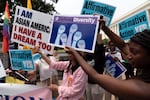
FILE - Demonstrators protest outside of the Supreme Court in Washington, in this June 29, 2023 file photo, after the Supreme Court struck down affirmative action in college admissions, saying race cannot be a factor.
Jose Luis Magana / AP
Writing about feeling more comfortable with being Black
When Darrian Merritt started writing his essay, his first instinct was to write about events that led to him going to live with his grandmother as a child. Those were painful memories, but he thought they might play well at schools like Yale, Stanford and Vanderbilt.
“I feel like the admissions committee might expect a sob story or a tragic story,” said Merritt, a senior in Cleveland. “I wrestled with that a lot.”
Eventually he abandoned the idea and aimed for an essay that would stand out for its positivity.
Merritt wrote about a summer camp where he started to feel more comfortable in his own skin. He described embracing his personality and defying his tendency to please others. But the essay also reflects on his feelings of not being “Black enough” and getting made fun of for listening to “white people music.”
Related: Oregon colleges, universities weigh potential outcomes of US Supreme Court decision on affirmative action
Essay about how to embrace natural hair
When Hillary Amofa started writing her college essay, she told the story she thought admissions offices wanted to hear. About being the daughter of immigrants from Ghana and growing up in a small apartment in Chicago. About hardship and struggle.
Then she deleted it all.
“I would just find myself kind of trauma-dumping,” said the 18-year-old senior at Lincoln Park High School in Chicago. “And I’m just like, this doesn’t really say anything about me as a person.”
Amofa was just starting to think about her essay when the court issued its decision, and it left her with a wave of questions. Could she still write about her race? Could she be penalized for it? She wanted to tell colleges about her heritage but she didn’t want to be defined by it.
In English class, Amofa and her classmates read sample essays that all seemed to focus on some trauma or hardship. It left her with the impression she had to write about her life’s hardest moments to show how far she’d come. But she and some classmates wondered if their lives had been hard enough to catch the attention of admissions offices.

Hillary Amofa, laughs as she participates in a team building game with members of the Lincoln Park High School step team after school Friday, March 8, 2024, in Chicago. When she started writing her college essay, Amofa told the story she thought admissions offices wanted to hear. She wrote about being the daughter of immigrants from Ghana, about growing up in a small apartment in Chicago. She described hardship and struggle. Then she deleted it all. "I would just find myself kind of trauma-dumping," said the 18 year-old senior, "And I'm just like, this doesn't really say anything about me as a person."
Charles Rex Arbogast / AP
Amofa used to think affirmative action was only a factor at schools like Harvard and Yale. After the court’s ruling, she was surprised to find that race was taken into account even at public universities she was applying to.
Now, without affirmative action, she wondered if mostly white schools will become even whiter.
It’s been on her mind as she chooses between Indiana University and the University of Dayton, both of which have relatively few Black students. When she was one of the only Black students in her grade school, she could fall back on her family and Ghanaian friends at church. At college, she worries about loneliness.
“That’s what I’m nervous about,” she said. “Going and just feeling so isolated, even though I’m constantly around people.”
Related: Some Oregon universities, politicians disappointed in Supreme Court decision on affirmative action
The first drafts of her essay didn’t tell colleges about who she is now, she said.
Her final essay describes how she came to embrace her natural hair. She wrote about going to a mostly white grade school where classmates made jokes about her afro.
Over time, she ignored their insults and found beauty in the styles worn by women in her life. She now runs a business doing braids and other hairstyles in her neighborhood.
“Criticism will persist,” she wrote “but it loses its power when you know there’s a crown on your head!”
Ma reported from Portland, Oregon.
The Associated Press’ education coverage receives financial support from multiple private foundations. AP is solely responsible for all content. Find AP’s standards for working with philanthropies, a list of supporters and funded coverage areas at AP.org .
OPB’s First Look newsletter
Streaming Now
BBC The Arts Hour
Should college essays touch on race? Some say affirmative action ruling leaves them no choice

- Show more sharing options
- Copy Link URL Copied!
When she started writing her college essay, Hillary Amofa told the story she thought admissions offices wanted to hear. About being the daughter of immigrants from Ghana and growing up in a small apartment in Chicago. About hardship and struggle.
Then she deleted it all.
“I would just find myself kind of trauma-dumping,” said the 18-year-old senior at Lincoln Park High School in Chicago. “And I’m just like, this doesn’t really say anything about me as a person.”
When the Supreme Court ended affirmative action in higher education , it left the college essay as one of few places where race can play a role in admissions decisions. For many students of color, instantly more was riding on the already high-stakes writing assignment. Some say they felt pressure to exploit their hardships as they competed for a spot on campus.
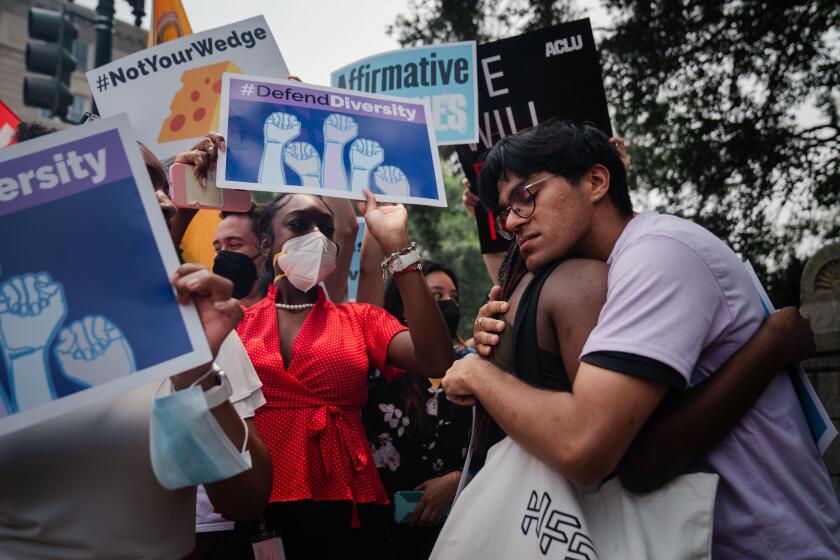
Supreme Court strikes down race-based affirmative action in college admissions
In another major reversal, the Supreme Court forbids the use of race as an admissions factor at colleges and universities.
June 29, 2023
Amofa was just starting to think about her essay when the court issued its decision, and it left her with a wave of questions. Could she still write about her race? Could she be penalized for it? She wanted to tell colleges about her heritage but she didn’t want to be defined by it.
In English class, Amofa and her classmates read sample essays that all seemed to focus on some trauma or hardship. It left her with the impression she had to write about her life’s hardest moments to show how far she’d come. But she and some classmates wondered if their lives had been hard enough to catch the attention of admissions offices.
This year’s senior class is the first in decades to navigate college admissions without affirmative action. The Supreme Court upheld the practice in decisions going back to the 1970s, but this court’s conservative supermajority found it is unconstitutional for colleges to give students extra weight because of their race alone.
Still, the decision left room for race to play an indirect role: Chief Justice John G. Roberts Jr. wrote that universities can still consider how an applicant’s life was shaped by their race, “so long as that discussion is concretely tied to a quality of character or unique ability.”
Scores of colleges responded with new essay prompts asking about students’ backgrounds.

Post-affirmative action, Asian American families are more stressed than ever about college admissions
Parents who didn’t grow up in the American system, and who may have moved to the U.S. in large part for their children’s education, feel desperate and in-the-dark. Some shell out tens of thousands of dollars for consultants as early as junior high.
Nov. 26, 2023
When Darrian Merritt started writing his essay, his first instinct was to write about events that led to him going to live with his grandmother as a child. Those were painful memories, but he thought they might play well at schools like Yale, Stanford and Vanderbilt.
“I feel like the admissions committee might expect a sob story or a tragic story,” said Merritt, a senior in Cleveland. “I wrestled with that a lot.”
Eventually he abandoned the idea and aimed for an essay that would stand out for its positivity.
Merritt wrote about a summer camp where he started to feel more comfortable in his own skin. He described embracing his personality and defying his tendency to please others. But the essay also reflects on his feelings of not being “Black enough” and being made fun of for listening to “white people music.”
Like many students, Max Decker of Portland, Ore., had drafted a college essay on one topic, only to change direction after the Supreme Court ruling in June.
Decker initially wrote about his love for video games. In a childhood surrounded by constant change, navigating his parents’ divorce, the games he took from place to place on his Nintendo DS were a source of comfort.
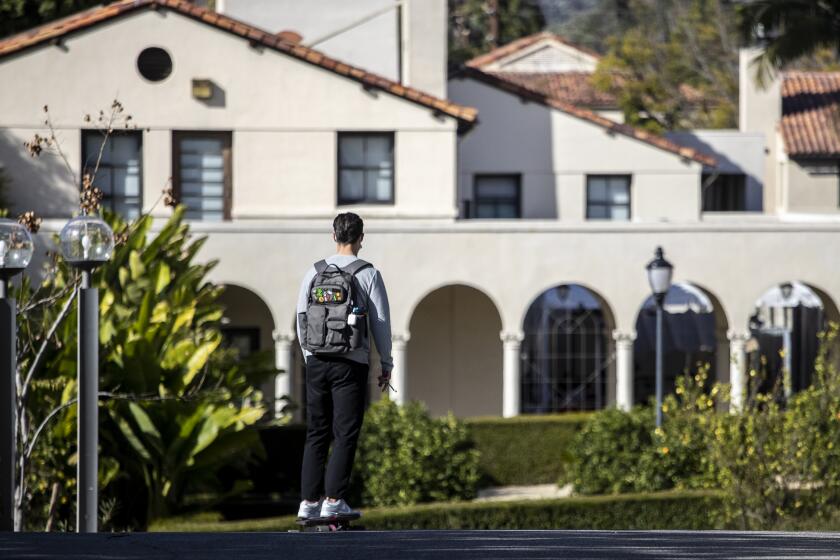
‘We’re really worried’: What do colleges do now after affirmative action ruling?
The Supreme Court’s ban on affirmative action has triggered angst on campuses about how to promote diversity without considering race in admissions decisions.
But the essay he submitted to colleges focused on the community he found through Word Is Bond, a leadership group for young Black men in Portland.
As the only biracial, Jewish kid with divorced parents in a predominantly white, Christian community, Decker wrote he felt like the odd one out. On a trip with Word Is Bond to Capitol Hill, he and friends who looked just like him shook hands with lawmakers. The experience, he wrote, changed how he saw himself.
“It’s because I’m different that I provide something precious to the world, not the other way around,” wrote Decker, whose top college choice is Tulane in New Orleans because of the region’s diversity.
Amofa used to think affirmative action was only a factor at schools like Harvard and Yale. After the court’s ruling, she was surprised to find that race was taken into account even at public universities she was applying to.
Now, without affirmative action, she wondered if mostly white schools will become even whiter.
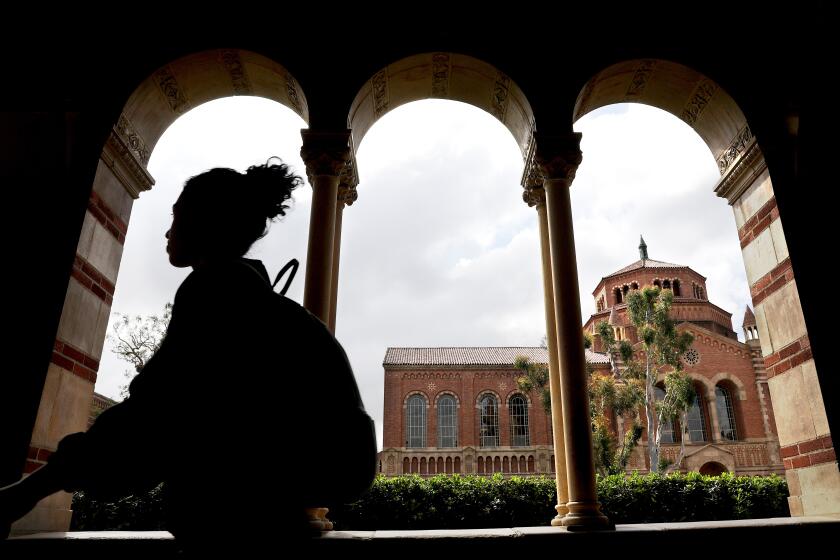
A lot of what you’ve heard about affirmative action is wrong
Debate leading up to the Supreme Court’s decision has stirred up plenty of misconceptions. We break down the myths and explain the reality.
It’s been on her mind as she chooses between Indiana University and the University of Dayton, both of which have relatively few Black students. When she was one of the only Black students in her grade school, she could fall back on her family and Ghanaian friends at church. At college, she worries about loneliness.
“That’s what I’m nervous about,” she said. “Going and just feeling so isolated, even though I’m constantly around people.”
The first drafts of her essay didn’t tell colleges about who she is now, she said. Her final essay describes how she came to embrace her natural hair. She wrote about going to a mostly white grade school where classmates made jokes about her afro.
Over time, she ignored their insults and found beauty in the styles worn by women in her life. She now runs a business doing braids and other hairstyles in her neighborhood.
“Criticism will persist,” she wrote “but it loses its power when you know there’s a crown on your head!”
Collin Binkley, Annie Ma and Noreen Nasir write for the Associated Press. Binkley and Nasir reported from Chicago and Ma from Portland, Ore.
More to Read

Editorial: Early decision admissions for college unfairly favor wealthy students
Jan. 4, 2024
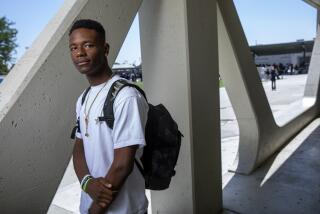
HBCUs brace for flood of applications after Supreme Court affirmative action decision
Sept. 22, 2023

Opinion: In a post-affirmative action world, employers should learn from California’s experience
Sept. 16, 2023
Start your day right
Sign up for Essential California for news, features and recommendations from the L.A. Times and beyond in your inbox six days a week.
You may occasionally receive promotional content from the Los Angeles Times.
More From the Los Angeles Times
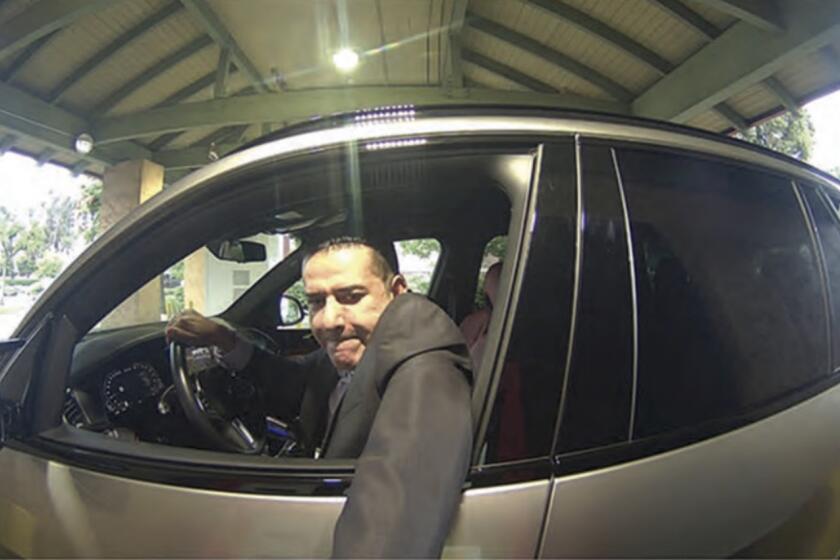
Former official pleads guilty to embezzling nearly $16 million from O.C. school district
March 29, 2024
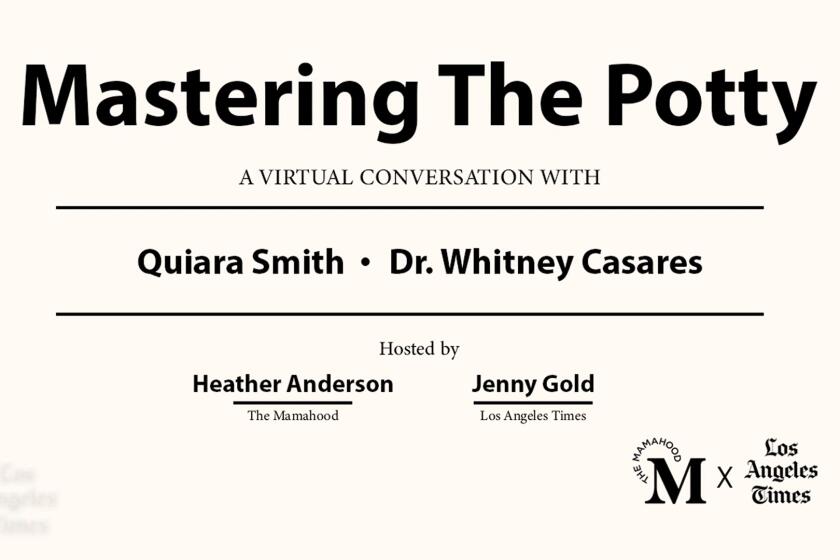
Is your child struggling to master the potty? These 5 takeaways from our panel can help
March 28, 2024
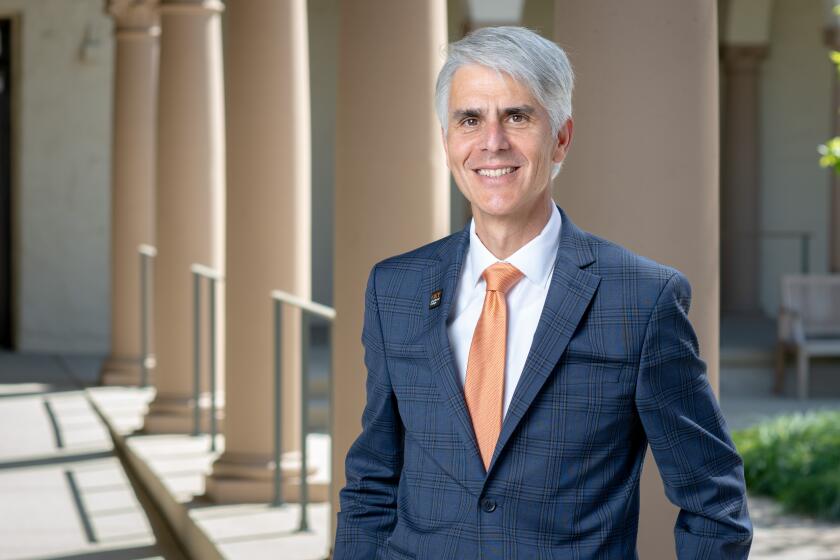
New Occidental College president bullish on liberal arts, champion of equity and inclusion
March 26, 2024
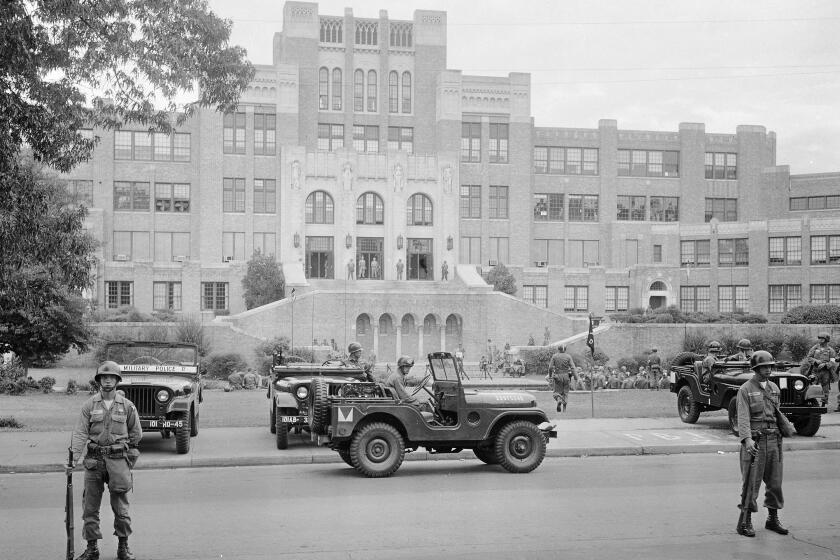
World & Nation
High school teacher and students sue over Arkansas’ ban on critical race theory
My Davidson | A Student Blog Photo Essay: English Scholars Go to AWP Conference
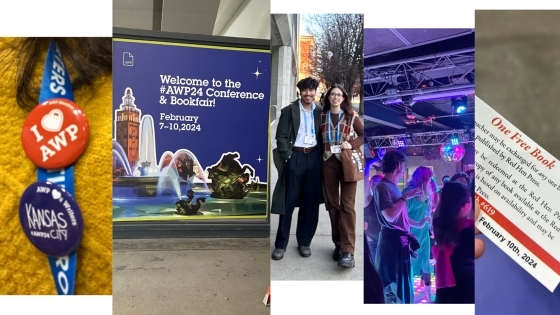
In February, Abbott Scholars in Davidson College’s English Department had the opportunity to attend the AWP (Association of Writers & Writer Programs) Conference in Kansas City. Check out their photos and reflections.
About the Authors
Isabel smith '24: poetry & book fairs.
The Abbott Scholars Program allows students to spend a year crafting either a scholarly or creative thesis on a topic of their choice, working alongside a director, a reader, and the other scholars. You get an extended period of time to produce strong writing, opportunities to talk with visiting authors, and the ability to request funding for related research and travel.
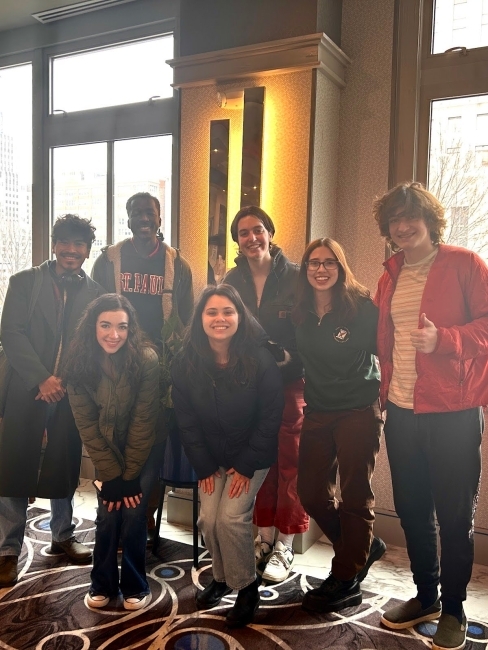
Abbott Scholars
One travel opportunity is the chance to attend the Association of Writers & Writer Programs (AWP) conference, which seven of us went to in February of this year. This year, the conference was in Kansas City, and it lasted three days: Thursday to Saturday. Each of us individually picked what panels to go to each day. I am writing a poetry thesis, so the first talk I attended was “Sound and Color: Poets and Visual Artists in Exquisite Exchange.” The presentation was my favorite of all of them because of how illuminating and beautiful it was. Each poet had partnered with a visual artist, and they shared the process of working in tandem to create together, displaying photographs, blurbs of text exchanges, paintings, and finally, the finished poetry. Due to this experience, I decided to incorporate visual art into my own practice, and I have since begun working on finding available art as well as creating some myself. Additionally, my mother is a painter and my father is a poet, so I was very excited to share what I had learned with the both of them.
Throughout the few days, I attended panels on drafting tips and tricks (featuring Davidson Professors Parker and Shavers), sharing elegies, queer post-religious poetry, and trans poetics, all of which were a pleasure and incredibly helpful. Another important aspect of the conference was the bookfair. It was a labyrinth, spanning an entire floor of the huge conference center. Besides fun and silly booths — like one labeled “Poetic Help” — the bookfair featured presses, literature reviews, and MFA programs, so I got the chance to talk to experts in the field of writing and publishing. They also tended to give out free books, excitingly, so I got quite the haul, all of which I can’t wait to read. At night, the seven of us — Tavie Kittredge, Michael Chapin, Nate Bagonza, Mason Davis, Taylor Dykes, Abby Morris, and myself — would explore the city, including events put on by AWPers. We went out to dinner together and attended the keynote, a poetry reading at a cat cafe, and a Rock & Roll-themed reading. It was amazing to bond with my peers and explore a new city. Thanks to the funding of the Abbott Scholars Program, I know much more about how to pursue a future in writing.

Michael Chapin ’24: Surrounded by Passionate Writers
The seven of us traveling together really solidified the bonds we’ve been building over the past semester and allowed us to spend time together outside of our thesis work, whether that was over Thai or ramen for dinner or just taking the time to explore the city.
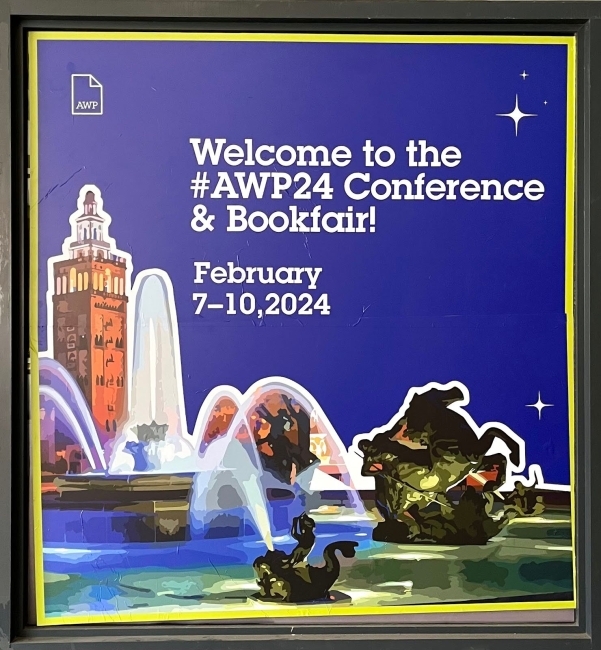
Getting to spend that time at AWP was incredibly special because, for me at least, it was the first time being surrounded by people deeply connected and committed to writing in all its forms. We attended events ranging from poetry readings at cat cafés to queer narrative presentations in speakeasy bars.
My personal highlight of the conference was listening to Jericho Brown deliver the keynote speech in which he called on us to challenge the world as we know it — to challenge book bans and our perception of the world as impossible to change. Brown asked why we can’t imagine a better world while acknowledging that a better world is not created without a fight. A quote from the speech that has stuck with me in the weeks since was his question: “If the fight is against fascism, who do we need to be if we lose that fight?” And then, who do we need to be to win?
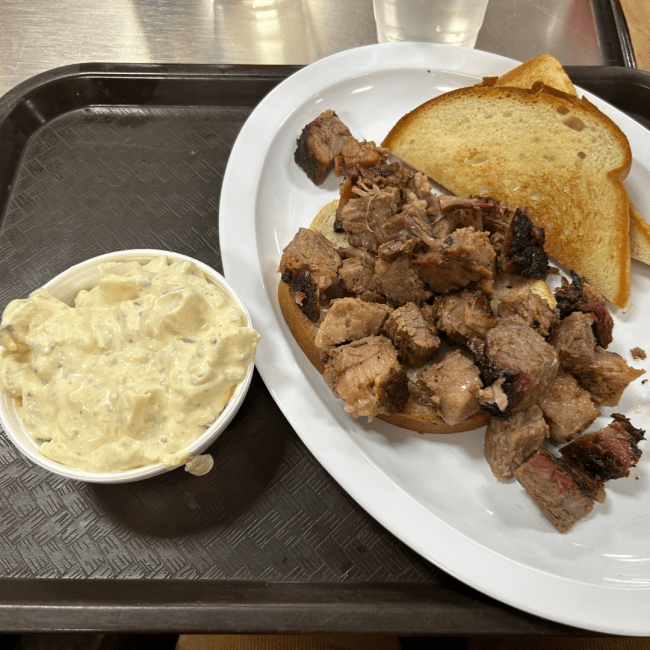
Trying a taste of Kansas City barbecue!
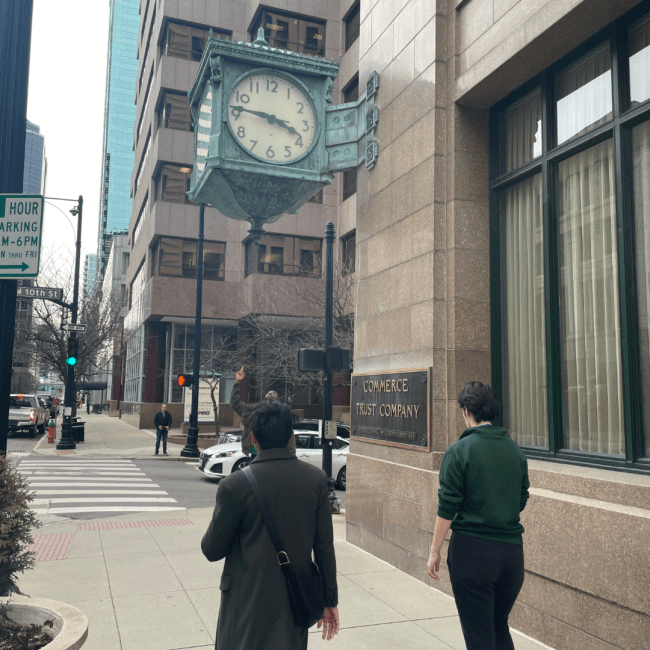
Exploring the streets of Kansas City.
Mason Davis '24: The Impact of AWP
The best part of the conference? Talking to authors, talking to MFA directors, talking to independent publishers … Being honest about what I wanted to know and not feeling awkward about lacking experience was so valuable.
The best single moment I had was cornering Susan Choi and telling her how much I loved Trust Exercise . She seemed so delighted that I loved the book, which warmed my heart. AWP carried an infectious feeling of immense creative potential that has stuck with me vividly.
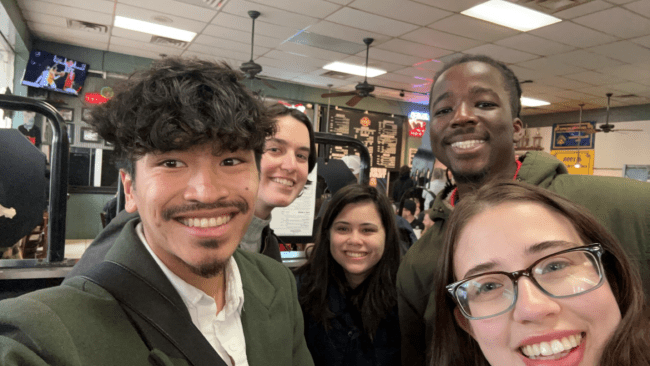
Now that I’ve seen a piece of the literary world, I want to be a part of it. I loved talking about books and the book-world all day. It felt a bit like the Davidson College campus except that everyone wants to do creative writing. That was a dream for me. I felt sad coming back to reality ... Sitting side-by-side with people who have just done a fantastic reading, or highly regarded editors, or publishers etc. etc. made me feel like my goals are imminently possible. There is so, so much writing out there and so many people making it work, somehow. If they can do it, so can I.
I'd also been skeptical about MFA programs (how will I afford it? is it even necessary?), but meeting all those MFA students and directors has convinced me that I'd be doing myself a serious disservice by not applying to programs in the next 1-5 years, depending on where life takes me. Not to get ahead of myself.
I want to express my gratitude to the Abbott family (and personally Susan, who was so wonderful to share a dinner with) for the opportunity to, in a sense, role-play as a 'real' writer for an extended weekend and get to try on those shoes. I liked how they fit. I can only speak with certainty for myself, but I know I felt (re)invigorated in becoming a person of letters.
Keep Exploring
Learn more about English at Davidson College
Learn more about the Abbott Scholars Program
- March 26, 2024
- My Davidson
- Share full article
Advertisement
Supported by
Guest Essay
Elite College Admissions Have Turned Students Into Brands

By Sarah Bernstein
Ms. Bernstein is a playwright, a writing coach and an essayist in Brooklyn.
“I just can’t think of anything,” my student said.
After 10 years of teaching college essay writing, I was familiar with this reply. For some reason, when you’re asked to recount an important experience from your life, it is common to forget everything that has ever happened to you. It’s a long-form version of the anxiety that takes hold at a corporate retreat when you’re invited to say “one interesting thing about yourself,” and you suddenly believe that you are the most boring person in the entire world. Once during a version of this icebreaker, a man volunteered that he had only one kidney, and I remember feeling incredibly jealous of him.
I tried to jog this student’s memory. What about his love of music? Or his experience learning English? Or that time on a summer camping trip when he and his friends had nearly drowned? “I don’t know,” he sighed. “That all seems kind of cliché.”
Applying to college has always been about standing out. When I teach college essay workshops and coach applicants one on one, I see my role as helping students to capture their voice and their way of processing the world, things that are, by definition, unique to each individual. Still, many of my students (and their parents) worry that as getting into college becomes increasingly competitive, this won’t be enough to set them apart.
Their anxiety in understandable. On Thursday, in a tradition known as “Ivy Day,” all eight Ivy League schools released their regular admission decisions. Top colleges often issue statements about how impressive (and competitive) their applicant pools were this cycle. The intention is to flatter accepted students and assuage rejected ones, but for those who have not yet applied to college, these statements reinforce the fear that there is an ever-expanding cohort of applicants with straight A’s and perfect SATs and harrowing camping trip stories all competing with one another for a vanishingly small number of spots.
This scarcity has led to a boom in the college consulting industry, now estimated to be a $2.9 billion business. In recent years, many of these advisers and companies have begun to promote the idea of personal branding — a way for teenagers to distinguish themselves by becoming as clear and memorable as a good tagline.
While this approach often leads to a strong application, students who brand themselves too early or too definitively risk missing out on the kind of exploration that will prepare them for adult life.
Like a corporate brand, the personal brand is meant to distill everything you stand for (honesty, integrity, high quality, low prices) into a cohesive identity that can be grasped at a glance. On its website, a college prep and advising company called Dallas Admissions explains the benefits of branding this way: “Each person is complex, yet admissions officers only have a small amount of time to spend learning about each prospective student. The smart student boils down key aspects of himself or herself into their personal ‘brand’ and sells that to the college admissions officer.”
Identifying the key aspects of yourself may seem like a lifelong project, but unfortunately, college applicants don’t have that kind of time. Online, there are dozens of lesson plans and seminars promising to walk students through the process of branding themselves in five to 10 easy steps. The majority begin with questions I would have found panic-inducing as a teenager, such as, “What is the story you want people to tell about you when you’re not in the room?”
Where I hoped others would describe me as “normal” or, in my wildest dreams, “cool,” today’s teenagers are expected to leave this exercise with labels like, Committed Athlete and Compassionate Leader or Environmentally Conscious Musician. Once students have a draft of their ideal self, they’re offered instructions for manifesting it (or at least, the appearance of it) in person and online. These range from common-sense tips (not posting illegal activity on social media) to more drastic recommendations (getting different friends).
It’s not just that these courses cut corners on self-discovery; it’s that they get the process backward. A personal brand is effective only if you can support it with action, so instead of finding their passion and values through experience, students are encouraged to select a passion as early as possible and then rack up the experience to substantiate it. Many college consultants suggest beginning to align your activities with your college ambitions by ninth grade, while the National Institute of Certified College Planners recommends students “talk with parents, guardians, and/or an academic adviser to create a clear plan for your education and career-related goals” in junior high.
The idea of a group of middle schoolers soberly mapping out their careers is both comical and depressing, but when I read student essays today, I can see that this advice is getting through. Over the past few years, I have been struck by how many high school seniors already have defined career goals as well as a C.V. of relevant extracurriculars to go with them. This widens the gap between wealthy students and those who lack the resources to secure a fancy research gig or start their own small business. (A shocking number of college applicants claim to have started a small business.) It also puts pressure on all students to define themselves at a moment when they are anxious to fit in and yet changing all the time.
In the world of branding, a word that appears again and again is “consistency.” If you are Charmin, that makes sense. People opening a roll of toilet paper do not want to be surprised. If you are a teenage human being, however, that is an unreasonable expectation. Changing one’s interests, opinions and presentation is a natural part of adolescence and an instructive one. I find that my students with scattershot résumés are often the most confident. They’re not afraid to push back against suggestions that ring false and will insist on revising their essay until it actually “feels like me.” On the other hand, many of my most accomplished students are so quick to accept feedback that I am wary of offering it, lest I become one more adult trying to shape them into an admission-worthy ideal.
I understand that for parents, prioritizing exploration can feel like a risky bet. Self-insight is hard to quantify and to communicate in a college application. When it comes to building a life, however, this kind of knowledge has more value than any accolade, and it cannot be generated through a brainstorming exercise in a six-step personal branding course online. To equip kids for the world, we need to provide them not just with opportunities for achievement, but with opportunities to fail, to learn, to wander and to change their minds.
In some ways, the college essay is a microcosm of modern adolescence. Depending on how you look at it, it’s either a forum for self-discovery or a high-stakes test you need to ace. I try to assure my students that it is the former. I tell them that it’s a chance to take stock of everything you’ve experienced and learned over the past 18 years and everything you have to offer as a result.
That can be a profound process. But to embark on it, students have to believe that colleges really want to see the person behind the brand. And they have to have the chance to know who that person is.
Sarah Bernstein is a playwright, a writing coach and an essayist.
The Times is committed to publishing a diversity of letters to the editor. We’d like to hear what you think about this or any of our articles. Here are some tips . And here’s our email: [email protected] .
Follow the New York Times Opinion section on Facebook , Instagram , TikTok , WhatsApp , X and Threads .

IMAGES
VIDEO
COMMENTS
One might think that a good essay gives the sense that there is nothing the author does not know. In fact, most good essays begin with an honest question or set of related questions (which sometimes appear in the actual essay), ques-tions that genuinely puzzle and interest the author—and, one can presume, the reader.
The intricate relationship between religion and culture is a subject of immense significance, shaping the values, behaviors, and traditions of societies worldwide. While religion and culture are distinct concepts, they are profoundly interconnected, often influencing and informing one another. This essay delves into how religion...
What matters is that narrative. Every essay must have a beginning, middle, and end. There must be a conflict, big or small, and there must a triumph, tiny or massive. While you write, you need to keep yourself at the center of the story. Don't let religion take over your role as the point of this essay. It's your college essay.
A good example is the latest abortion issue in the US, the overturning of "Wade vs. Roe." Include people's mixed reactions to this subject and their justifications. 5. Religion: Then and Now. On your essay, ddd the religion's history, its current situation in the country, and its old and new beliefs.
This guide is the result of a collaborative effort among several faculty members: Christopher White, who initiated the project while serving as the Head Tutor of Religious Studies; Faye Halpern of the Harvard Writing Project; and Professors Thomas A. Lewis (Study of Religion and Divinity School), Anne Monius (Divinity School), and Robert Orsi ...
The short answer is this: it's okay to discuss religion in your essay as long as the take-away (or values) promoted in the essay are universal. Here's what I mean: In the past, I've had students write essay drafts that end with something like, "Since accepting Christ (or) learning to meditate (or) converting to Judaism, I've made it ...
4 months ago. Writing about your religion in your college essays can certainly be illuminating, as long as it is done with nuance and focuses on your personal growth rather than doctrine. Colleges appreciate essays that are a reflection of personal beliefs and values, provided they can get a clear sense of who you are and how this aspect of ...
Theological Concepts. The Concept of God in Abrahamic Religions. Karma and Reincarnation in Hinduism. The Significance of Nirvana in Buddhism. Sufism: The Mystical Dimension of Islam. The Holy Trinity in Christianity: Interpretations and Beliefs.
Discussing religion in your college essay can be a powerful way to showcase your personal growth, values, and identity. Admissions officers appreciate essays that reflect honest and profound experiences that have shaped a student's character. The key, however, is to focus on the reflective and personal aspect of your experiences rather than to do theological expositions or attempt to proselytize.
Tip 1: Choosing a Topic for a Religion Essay. Image by Keenan Beasley on Unsplash. Consider a topic that interests you, one that piques your curiosity. Though it's said that curiosity kills the cat, it's a much-needed drive in essays, especially ones that deal with theology and mind-boggling ideas.
Writing about religion in a college essay does not necessarily require extensive knowledge or personal experience. While having a good understanding of the topic and personal experience can certainly enhance the depth and authenticity of the essay, it is not always a prerequisite. With sufficient research and understanding of different ...
How to Write a Theology and Religion Essay for College. Regardless of what type of paper it is, all Theology and Religion essays involve certain steps that, when followed with sincerity and precision, can set you up for success. Look at the step-by-step guide to writing a Theology and Religion essay for college. Pick a Focussed Topic
Absolutely, you can explore your religious beliefs in your college essay, including mentioning God. It's important to remember that admissions committees are interested in getting to know you as a whole person, and for many, faith is a significant part of their identity. Your essay should reflect who you are, and if that means discussing your religion, then that's what you should write about.
Intensely religious teens - who some researchers call "abiders" - are more likely than average to earn higher GPAs and complete more college education. By religious intensity, I refer to ...
Religion in a college essay. For some people, religion is integral to their lives and identities. Even so, you may consider religion a "touchy" subject. You may fear that the reader won't like your religion. Don't let that stop you if you have honest stories and reflections to relate. Consider writing a personal statement that reveals ...
Religion College Essays Example. Looking for a sample of college essays about religion? We've got one for you! Feel free to check out its structure and style and reuse it in your own essay. College students are expected to address more complicated problems in their papers. But you need to stay respectful while writing about religion in ...
Conclusion. The relationship between religion and war is a complex and multifaceted one. While religion has been a motivating factor in some conflicts throughout history, it is rarely the sole cause of war. Wars are more often the result of a combination of political, economic, social, and historical factors, with religion sometimes playing a ...
Details. In the following three essays, King wrestles with the role of religion in modern society. In the first assignment, he calls science and religion "different though converging truths" that both "spring from the same seeds of vital human needs.". King emphasizes an awareness of God's presence in the second document, noting that ...
I think this essay prompt is best used for a situation in which you overcame a negative belief-and portraying religion as a negative belief is probably not the best approach.</p>. BrownParent September 10, 2013, 12:49pm 6. <p>It's not a taboo subject, religion. However, I think this will not be a unique subject.
The religion started over 3500 years ago. The founder of the religion was Moses despite the fact that Jews draw their history back to Abraham. Other contributors of Judaism religion include Jacob and Isaac (Bbc.co.uk, 2014). The three patriarchs are the spiritual and physical ancestors of Judaism. 2.
Religion in College Essay . Personal Essay I am torn. I have read on multiple websites that religion is a topic to avoid in a common app essay. I was planning a bit of a different approach though. Rather than talking about the importance of my religion, I was going to talk about how leaving my religion has shaped me. Up until my junior year, I ...
Essay. Judaism Is a Religion of the Heart The familiar idea that Christianity is about love while Judaism is about law is a misunderstanding of Jewish tradition, a rabbi argues.
Mr. Beinart is the editor at large of Jewish Currents and a journalist and writer who has written extensively on the Middle East, Jewish life and American foreign policy. March 22, 2024. F or the ...
You need to talk about your experiences in your essays so if religion is important that you, make sure you talk about your experiences with your religion! ... r/ApplyingToCollege is the premier forum for college admissions questions, advice, and discussions, from college essays and scholarships to SAT/ACT test prep, career guidance, and more.
How the SAT Changed My Life. Ms. Nietfeld is the author of the memoir "Acceptance.". This month, the University of Texas, Austin, joined the wave of selective schools reversing Covid-era test ...
In general, if you're going to write an essay with a topic like this, you need to make sure you're leaning into the personal and not the more abstract part of this topic. An essay about how your experiences with religion and sexual orientation have shaped you as a person is great. An essay about Catholicism and sexual orientation in general is ...
Max Decker, a senior at Lincoln High School, sits for a portrait in the school library where he often worked on writing his college essays, in Portland, Ore., Wednesday, March 20, 2024.
When the Supreme Court ended affirmative action in higher education, it left the college essay as one of few places where race can play a role in admissions decisions. For many students of color ...
Photo. Bio. Michael Chapin '24 (he/him) is an English major from Atlanta, Georgia. Outside of being an Abbott Scholar, he is an avid runner, traveler and photographer, and in that vein, he serves as vice-president of Davidson's running club. He also serves as co-president of SIAD (Student Initiative for Academic Diversity) where he works to ...
Elite College Admissions Have Turned Students Into Brands. March 31, 2024, 1:00 a.m. ET. Janet Mac. By Sarah Bernstein. Ms. Bernstein is a playwright, a writing coach and an essayist in Brooklyn ...